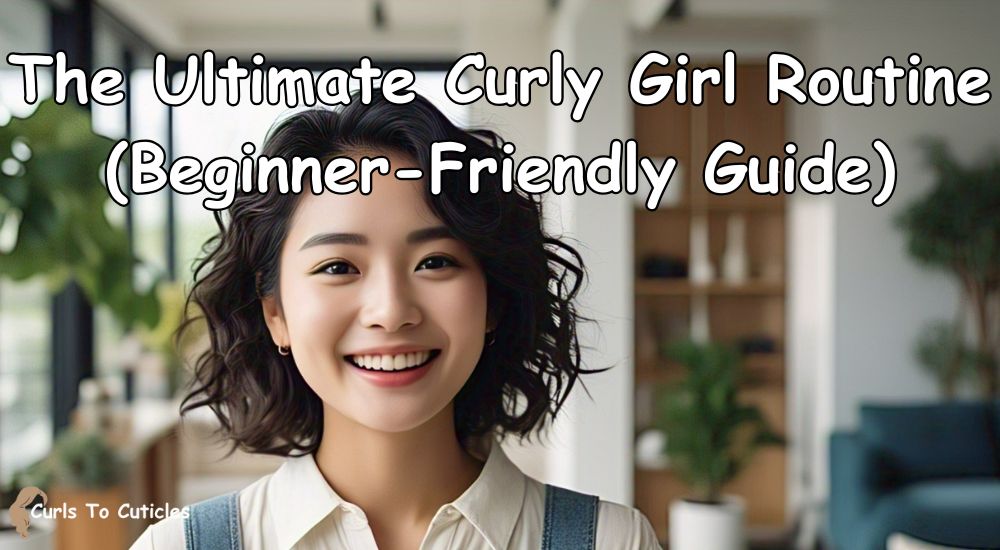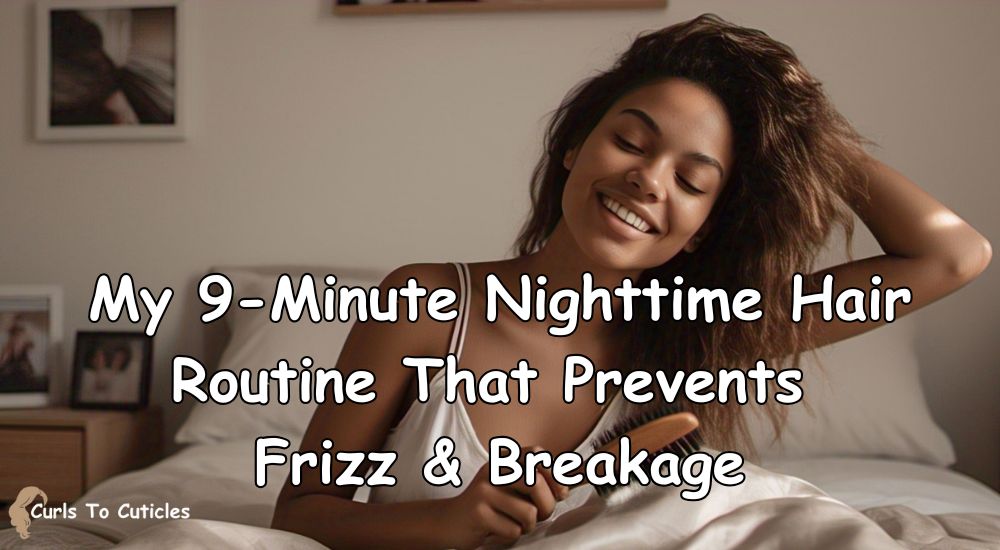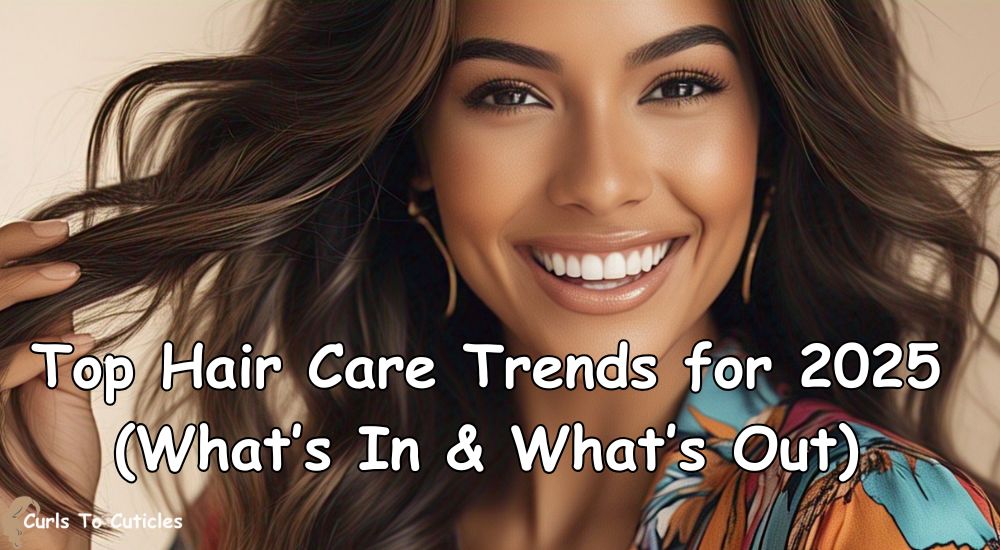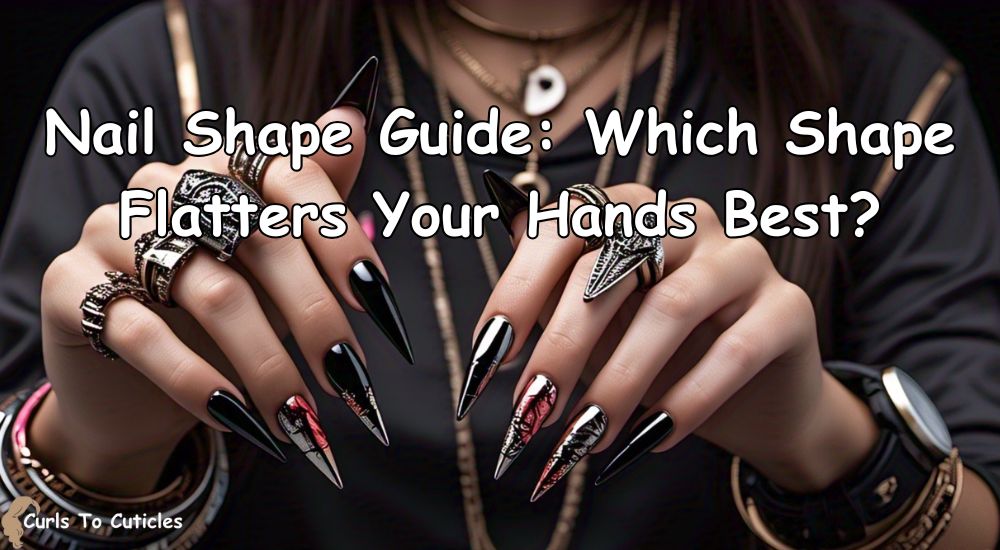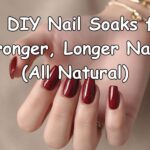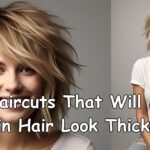Now Reading: The Best Hairstyles for Your Face Shape – Find Your Perfect Look
-
01
The Best Hairstyles for Your Face Shape – Find Your Perfect Look
The Best Hairstyles for Your Face Shape – Find Your Perfect Look
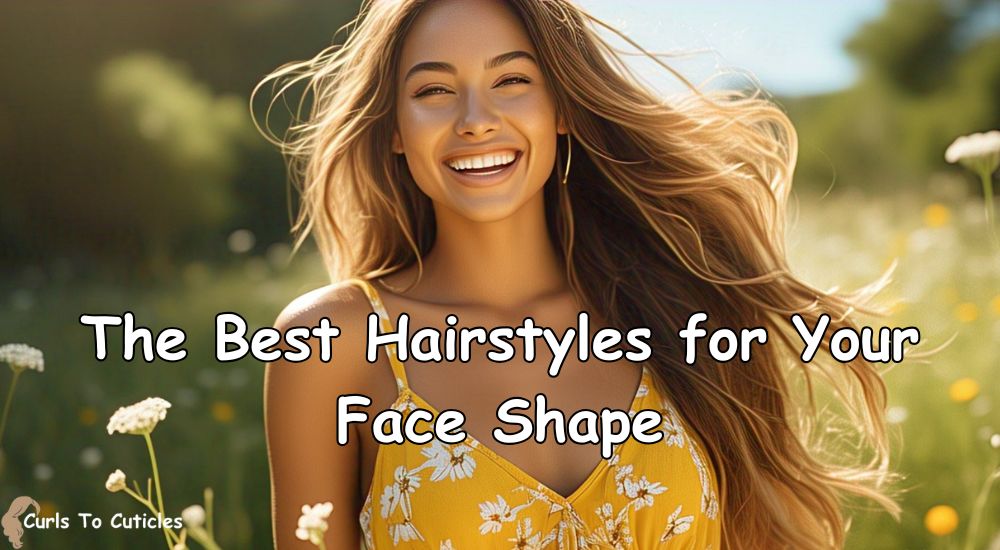
Finding the right hairstyle is easier when you know your face shape. I created this guide to help you choose styles that match your features. I kept the language clear, direct, and simple, so you can quickly understand what suits you best.
Let’s break it down by face shape. I’ll cover oval, round, square, heart, diamond, long, and triangle face shapes. I’ll also include tips for both short and long hair.
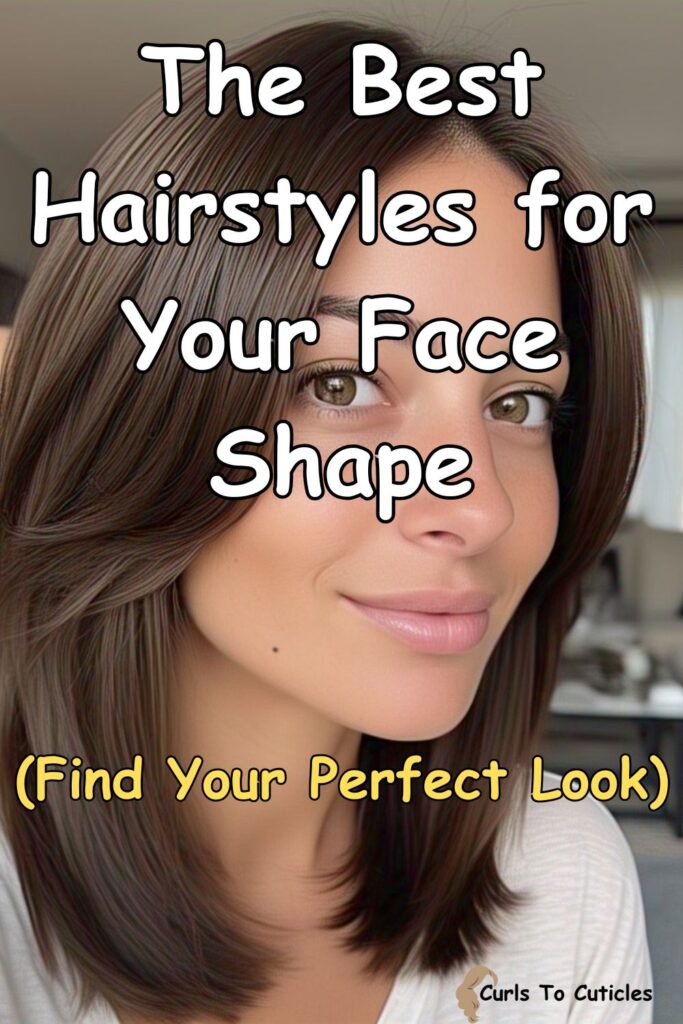
How to Identify Your Face Shape
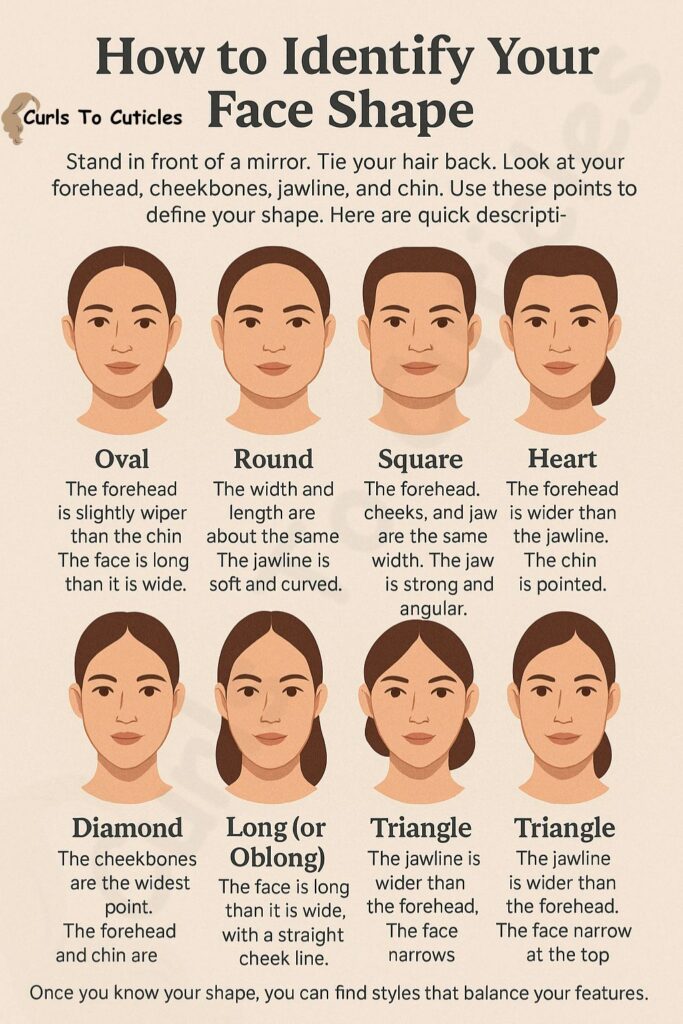
Stand in front of a mirror. Tie your hair back. Look at your forehead, cheekbones, jawline, and chin. Use these points to define your shape. Here are quick descriptions:
- Oval: The forehead is slightly wider than the chin. The face is longer than it is wide.
- Round: The width and length are about the same. The jawline is soft and curved.
- Square: The forehead, cheeks, and jaw are the same width. The jawline is strong and angular.
- Heart: The forehead is wider than the jawline. The chin is pointed.
- Diamond: The cheekbones are the widest point. The forehead and chin are narrow.
- Long (or Oblong): The face is longer than it is wide, with a straight cheek line.
- Triangle: The jawline is wider than the forehead. The face narrows at the top.
Once you know your shape, you can find styles that balance your features.
Best Hairstyles for Oval Faces
Oval faces are naturally balanced and versatile. Most hairstyles suit this shape, so feel free to experiment!
Short Hairstyles for Oval Faces
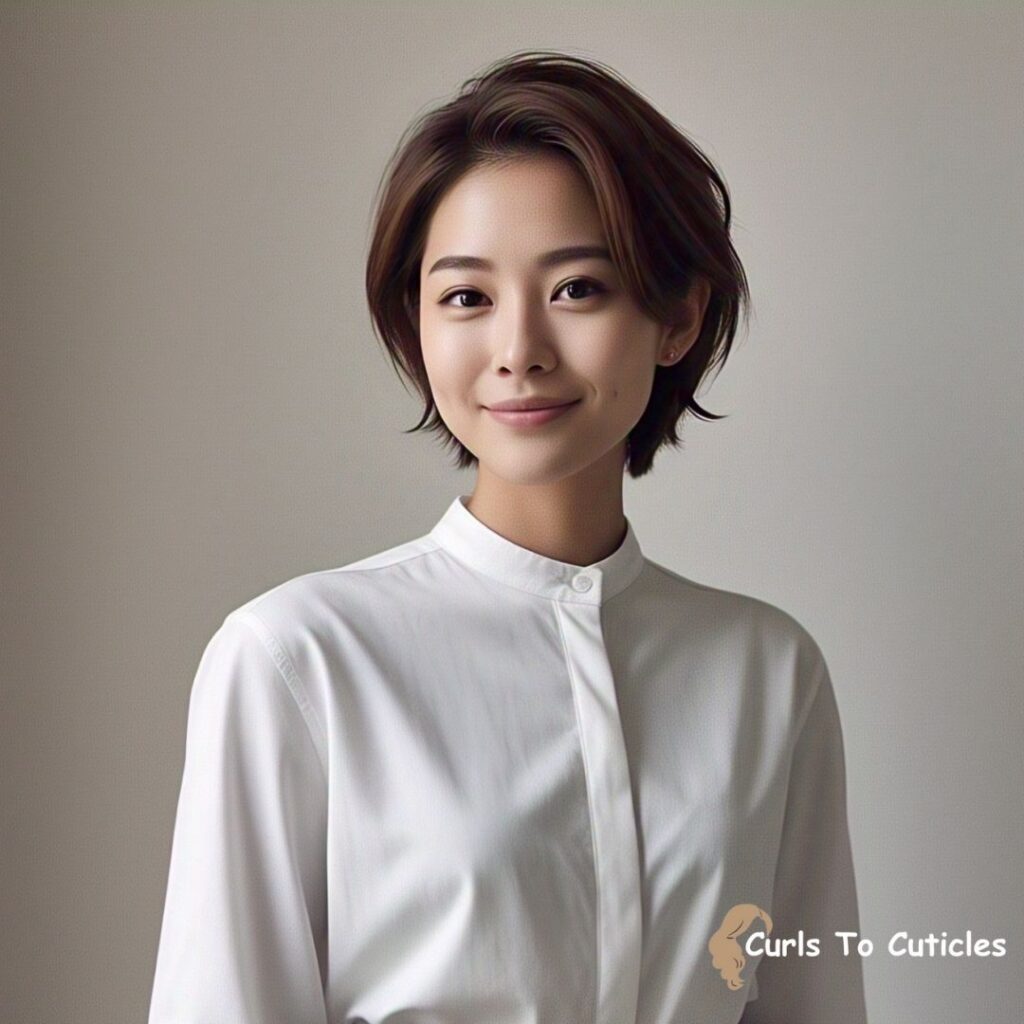
Go for classic pixie cuts with soft, feathered edges for a clean and fresh look. You can also try a sleek bob that ends at the chin or just below to show off your jawline. A side part adds subtle asymmetry for extra charm.
Medium Hairstyles for Oval Faces


Mid-length styles work wonderfully with layers. Soft, face-framing layers create movement and highlight your features. Side parts are preferred over center parts, as they bring more softness to your overall look.
Long Hairstyles for Oval Faces
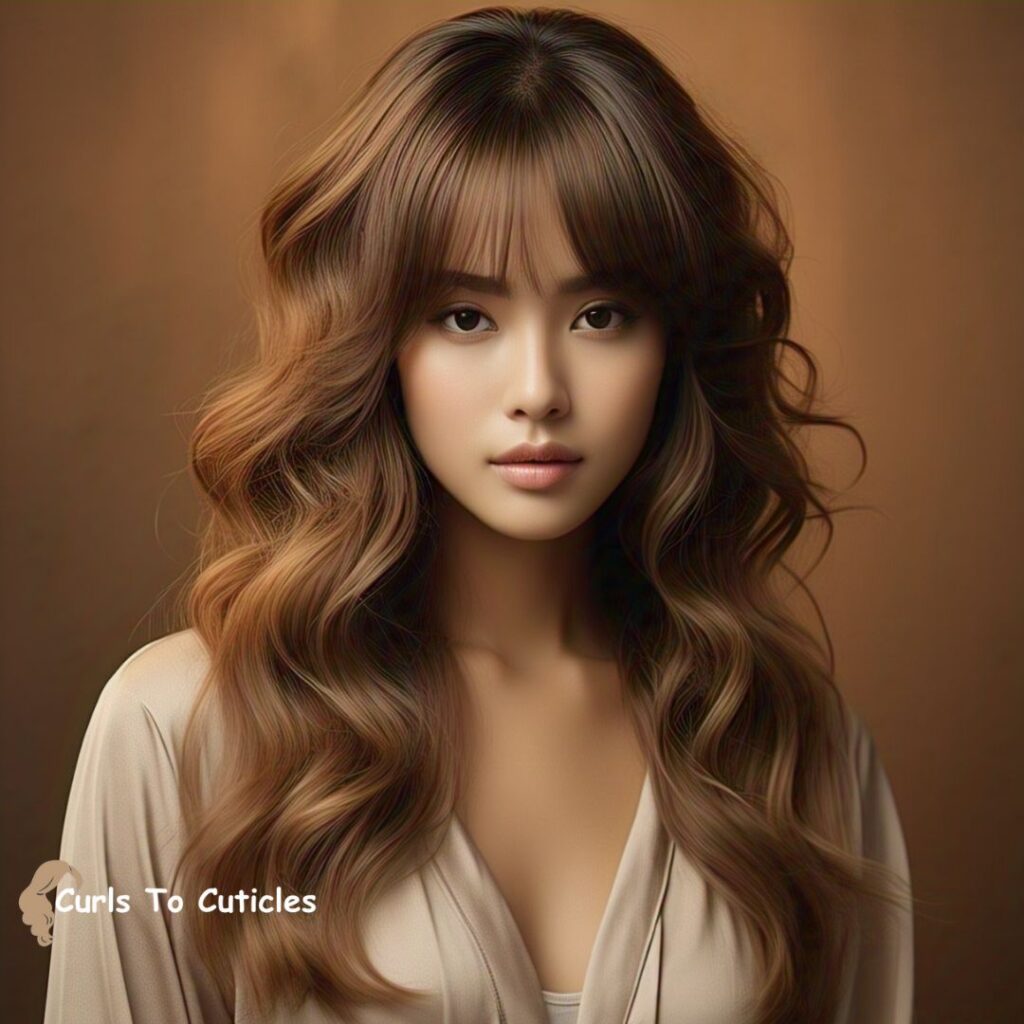
Long waves are ideal for oval faces, as they enhance your cheekbones and maintain balance. Add soft curls or layered ends for volume and texture. A side-swept fringe can also bring extra elegance.
Tips: Avoid heavy, full bangs that hide your natural face shape. Let your features shine.
Best Hairstyles for Round Faces
Round faces benefit from styles that elongate and add structure.
Short Hairstyles for Round Faces
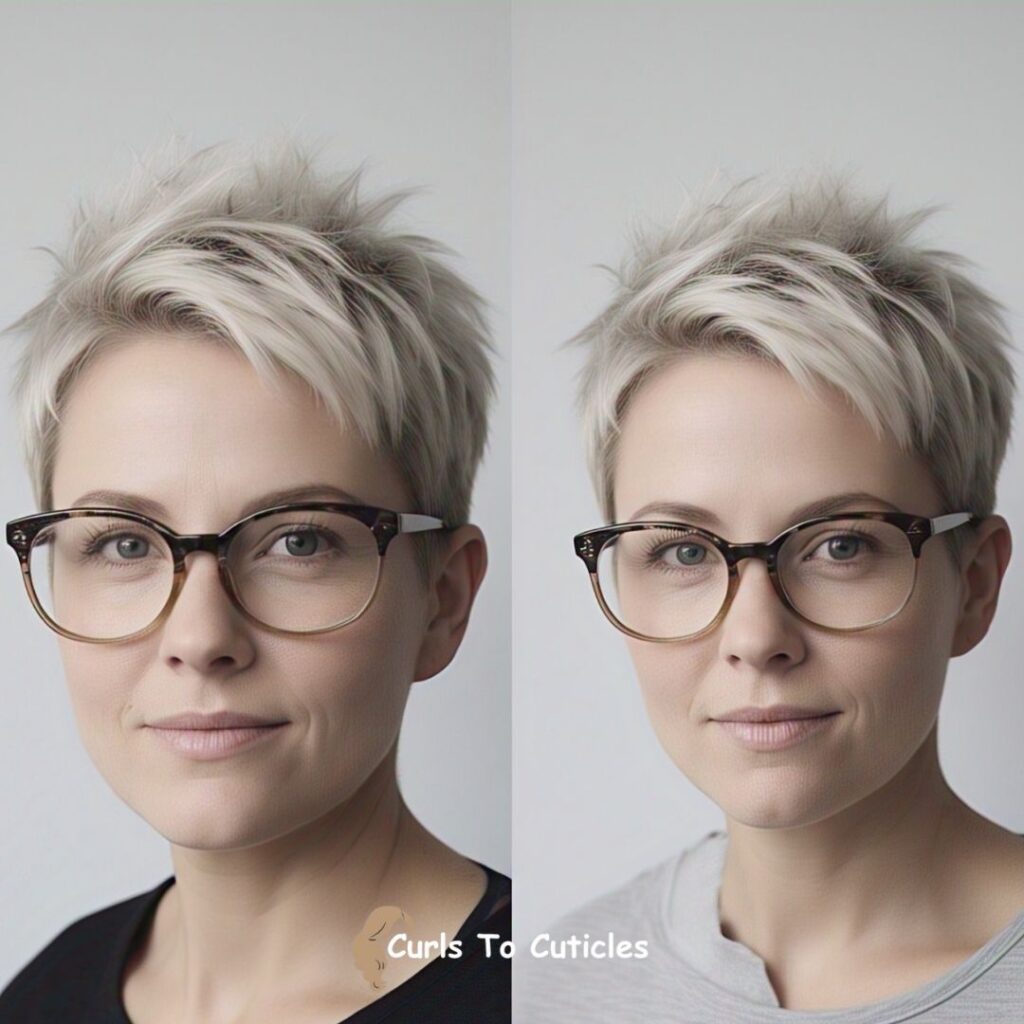
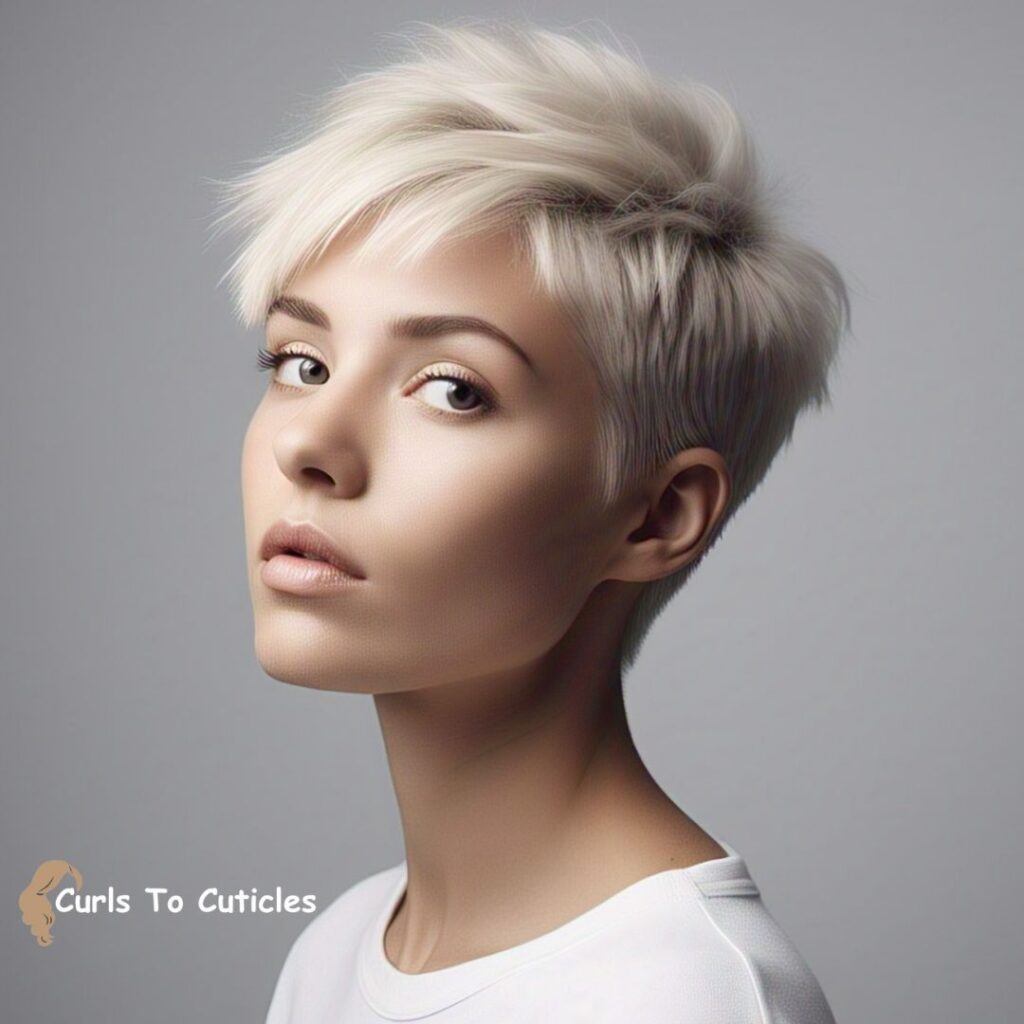
Opt for short cuts with volume at the crown. A pixie with height or a textured crop helps elongate the face. Avoid chin-length bobs, which can emphasize roundness. Instead, try angled bobs that are longer in the front.
Medium Hairstyles for Round Faces
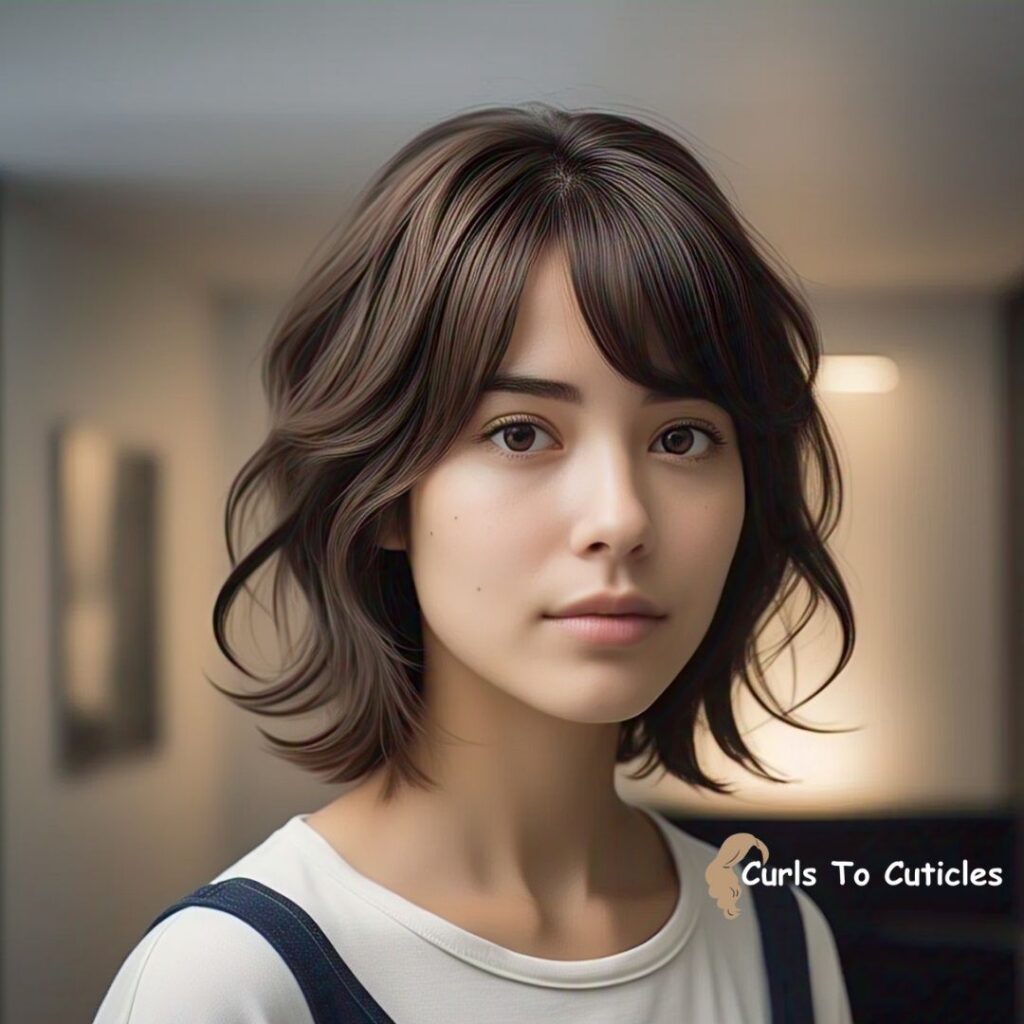
Shoulder-length styles with long layers work well to add length. Side-swept bangs help break up the round shape and guide the eyes diagonally. Stay away from styles with volume at the cheeks.
Long Hairstyles for Round Faces
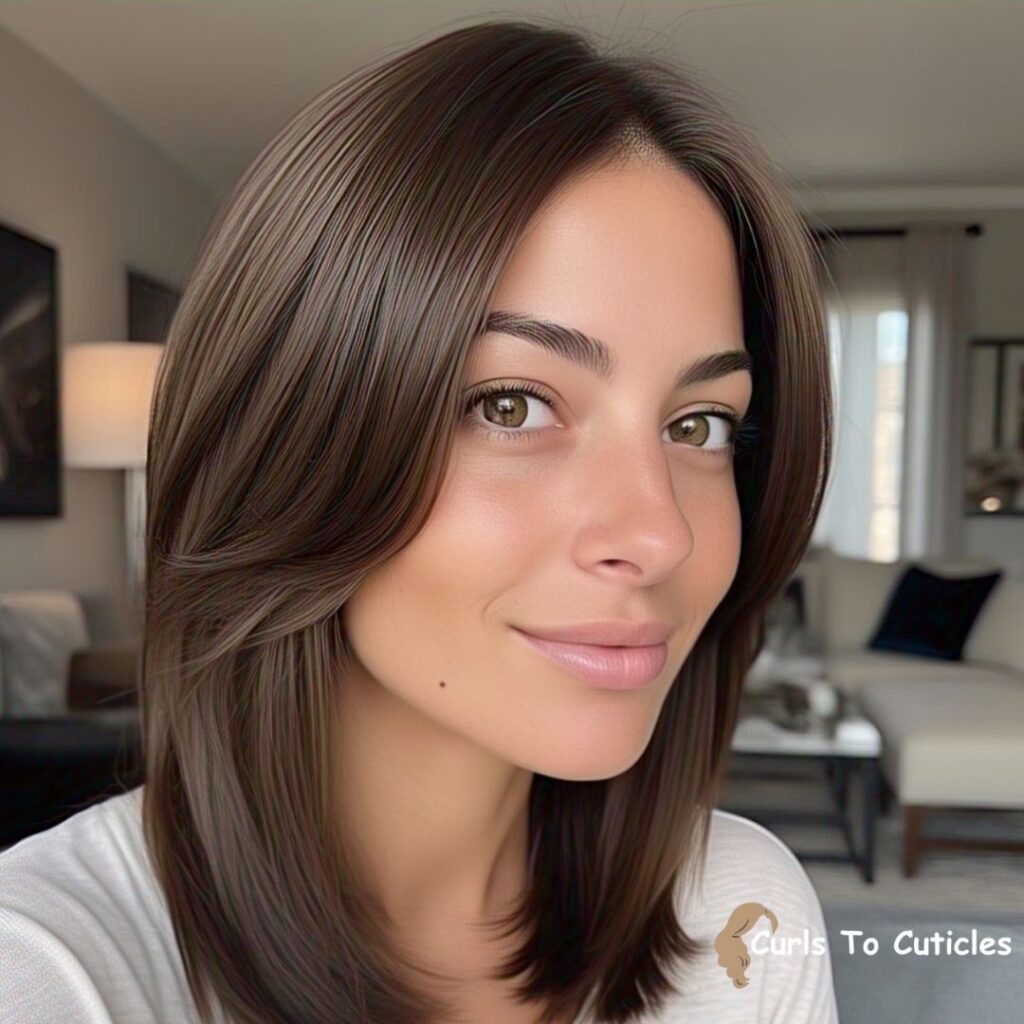
Long layers that fall below the chin elongate your face. Keep the hair sleek and add waves below the jawline. Avoid blunt ends and go for tapered or feathered tips to reduce roundness.
Tips: Go for styles with vertical lines. Keep volume at the top and avoid round, fluffy shapes.
Best Hairstyles for Square Faces
With strong jawlines, square faces need softness to balance angular features.
Short Hairstyles for Square Faces
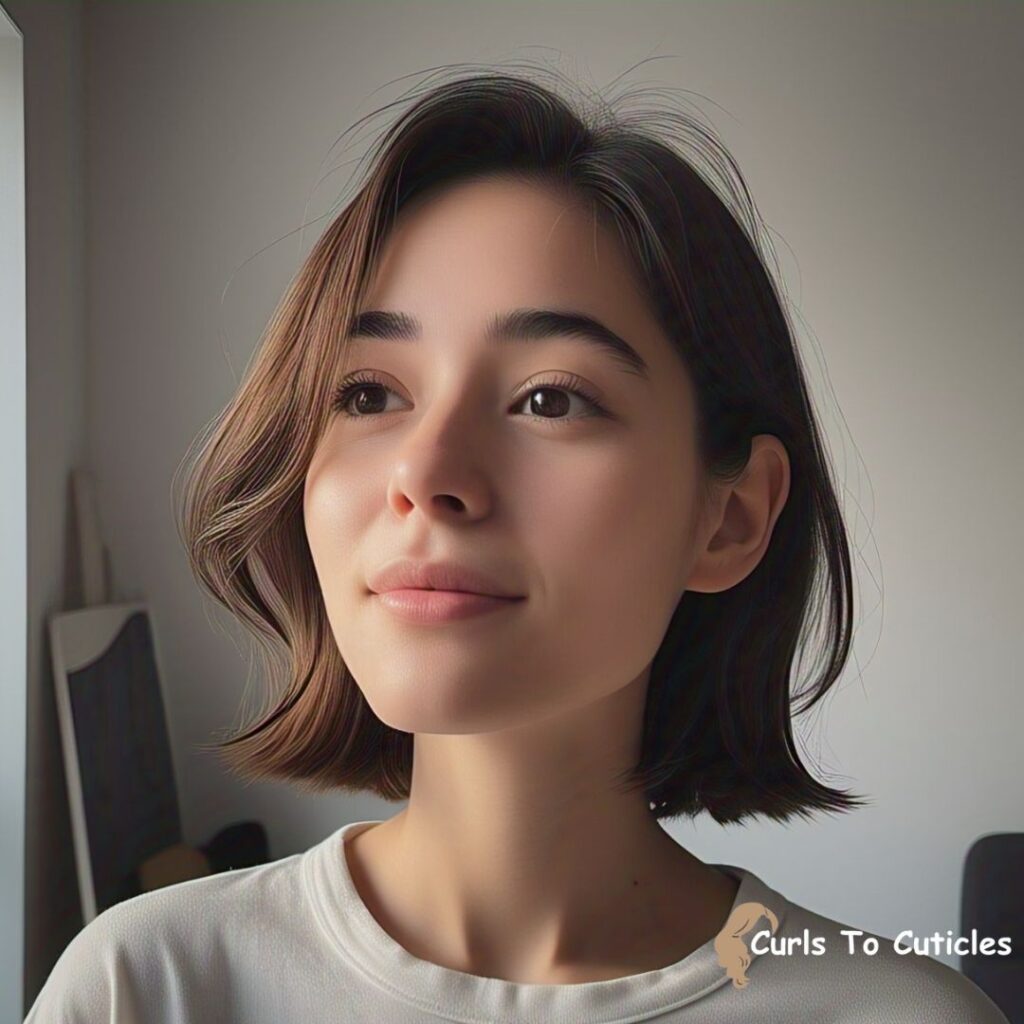
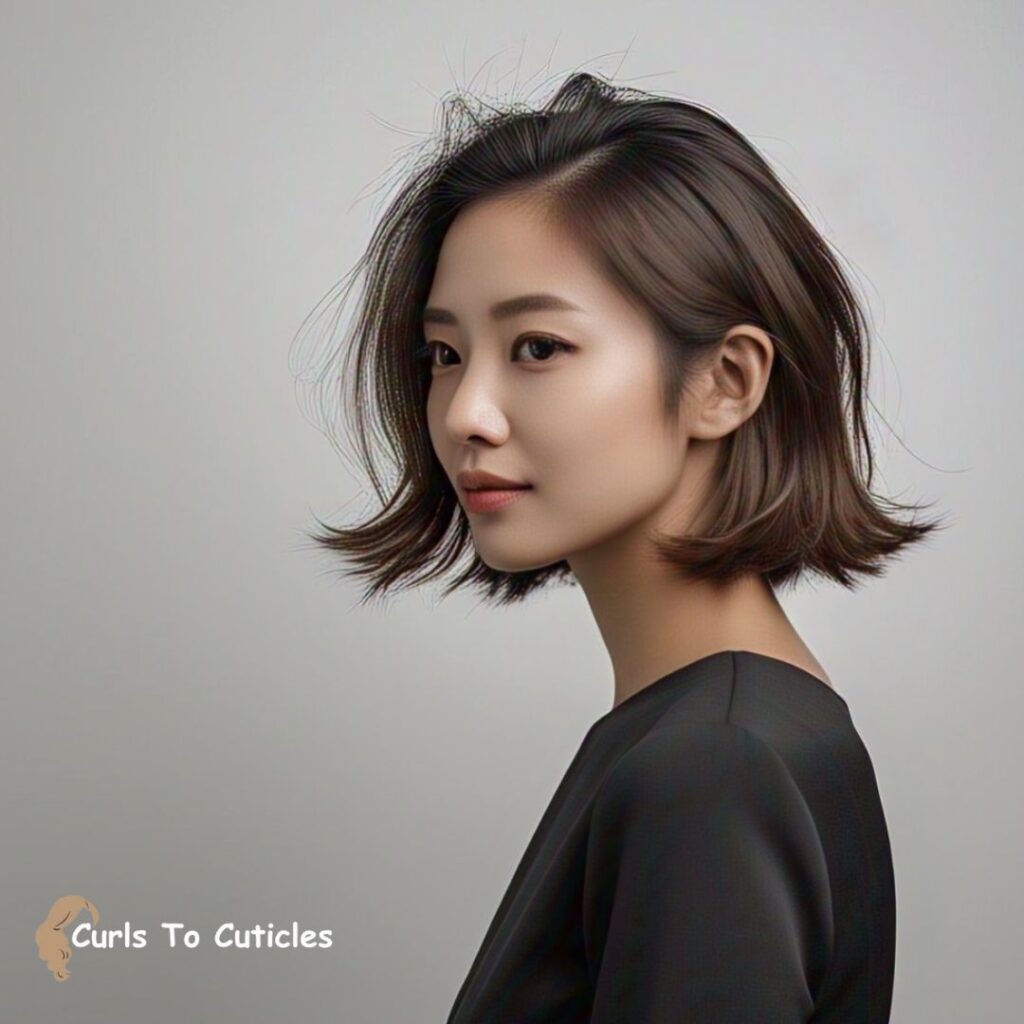
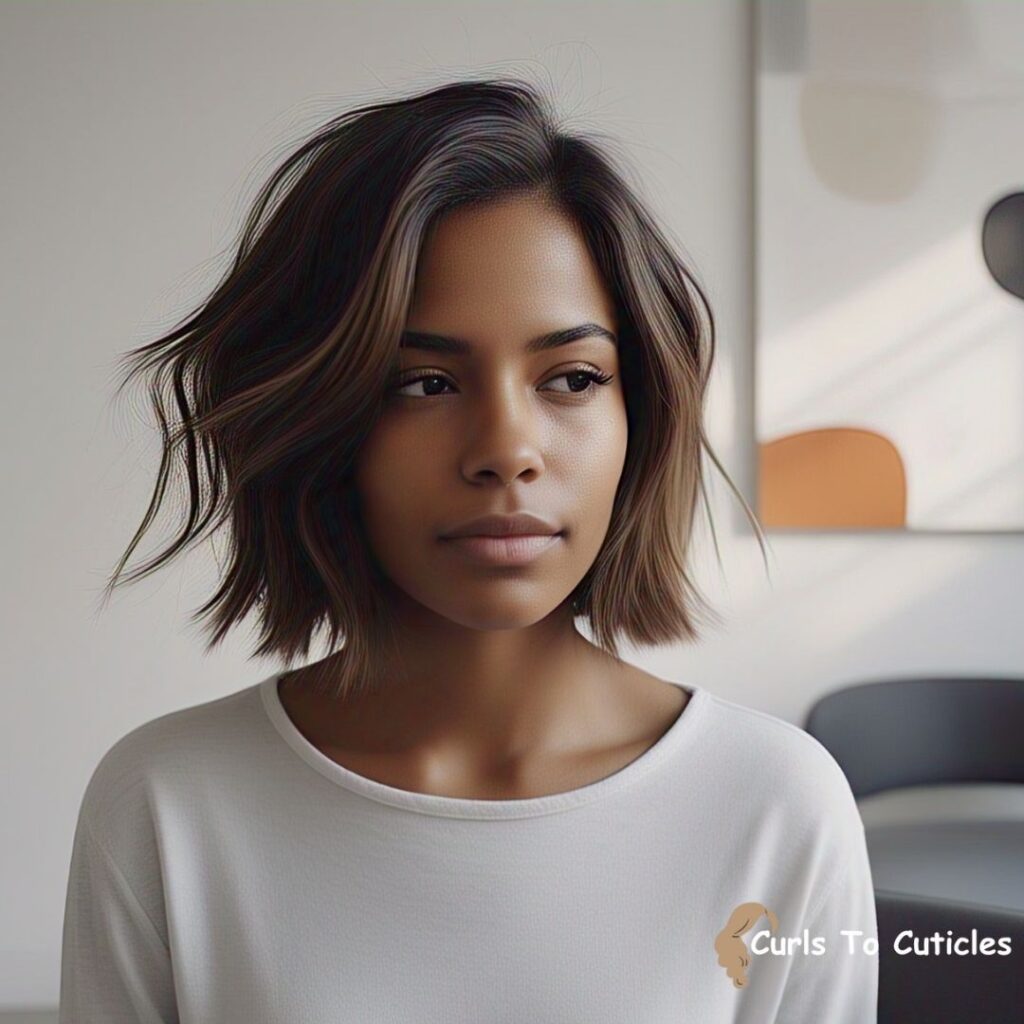
Choose a layered bob with wispy or feathered ends. A side part helps disrupt the strong horizontal jawline. Avoid sharp, blunt cuts that can exaggerate the square shape.
Medium Hairstyles for Square Faces
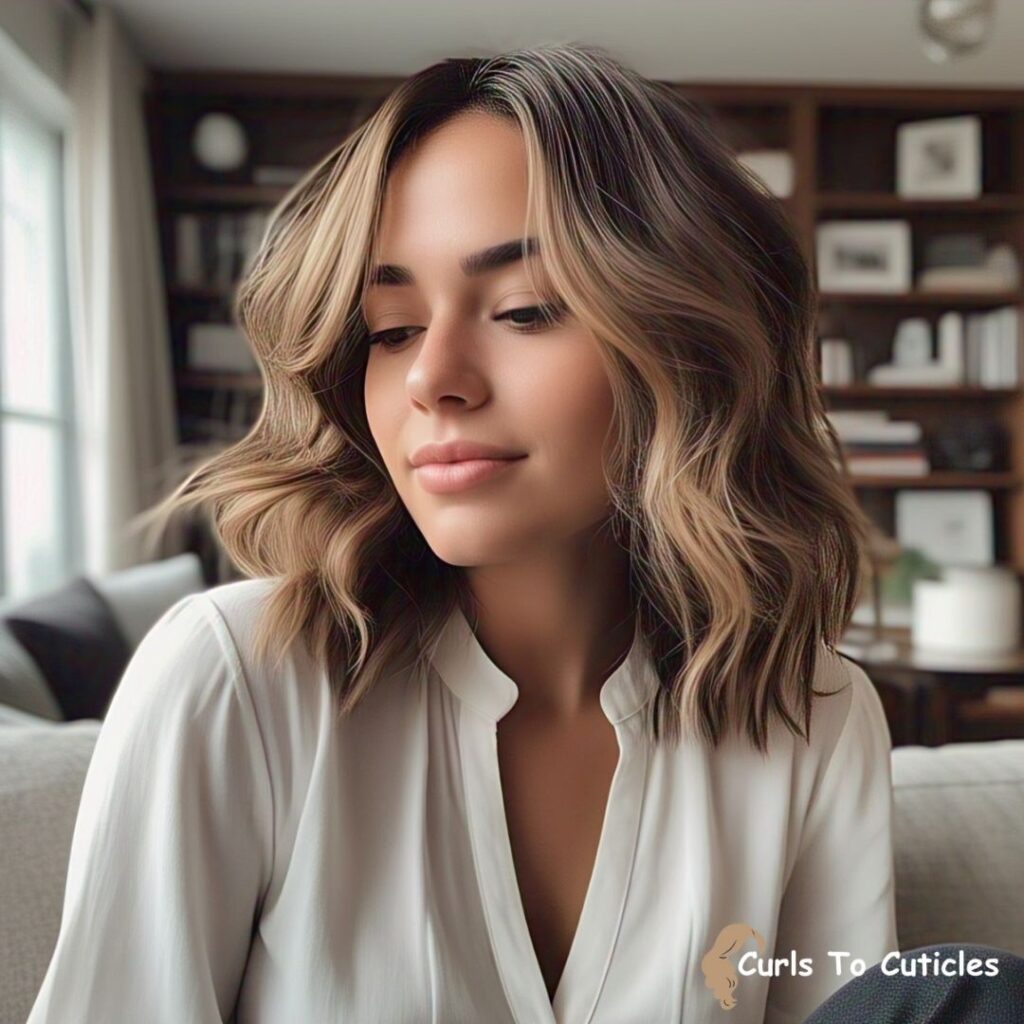
Shoulder-length styles with long, face-framing layers help soften angles. Waves that start just below the chin draw attention away from the jaw. Curved ends and side-swept fringe also add softness.
Long Hairstyles for Square Faces
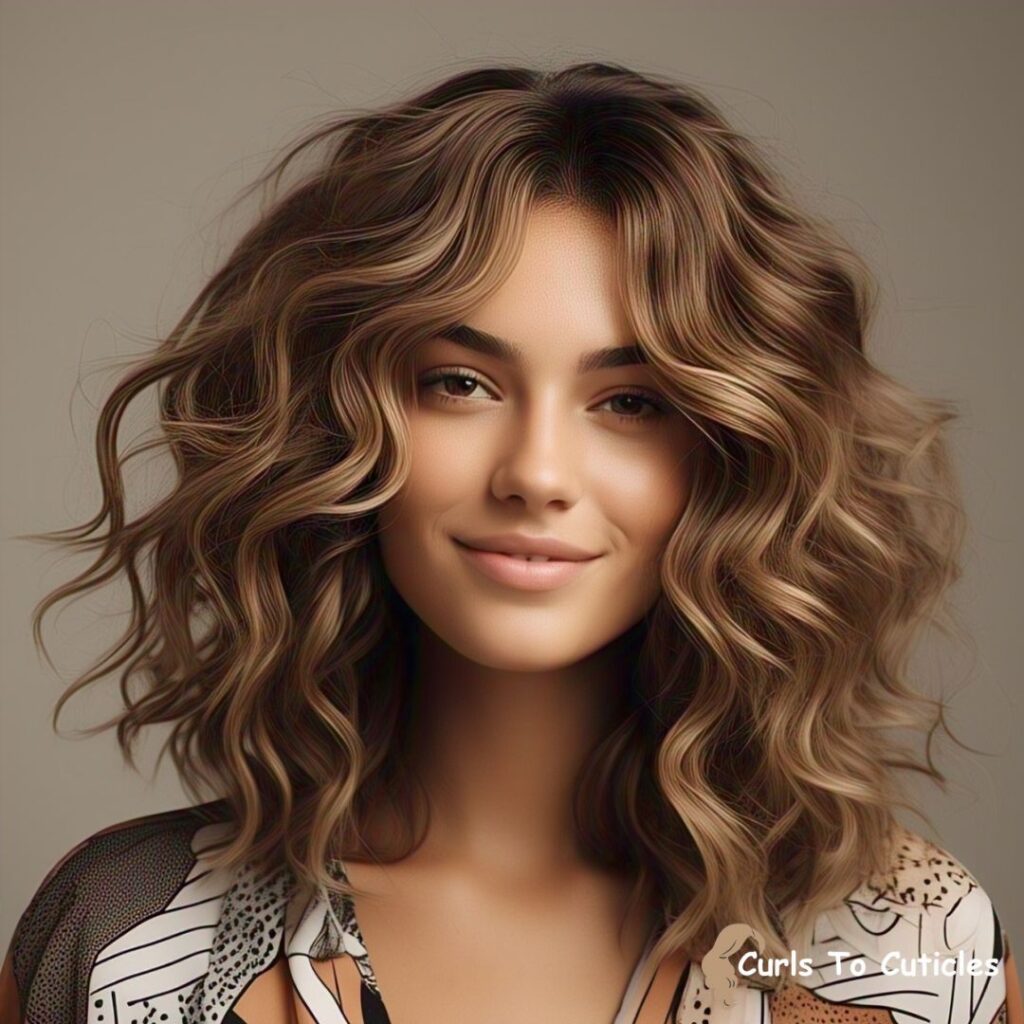
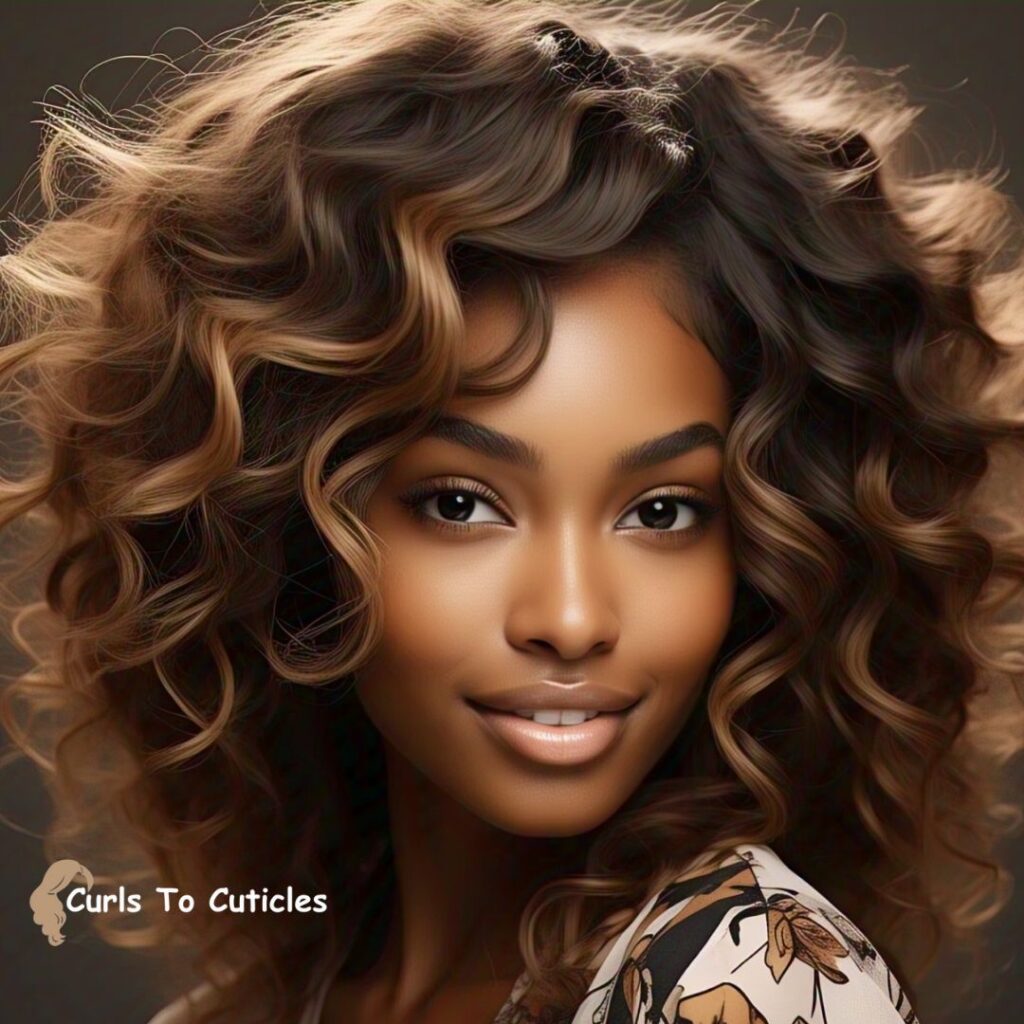
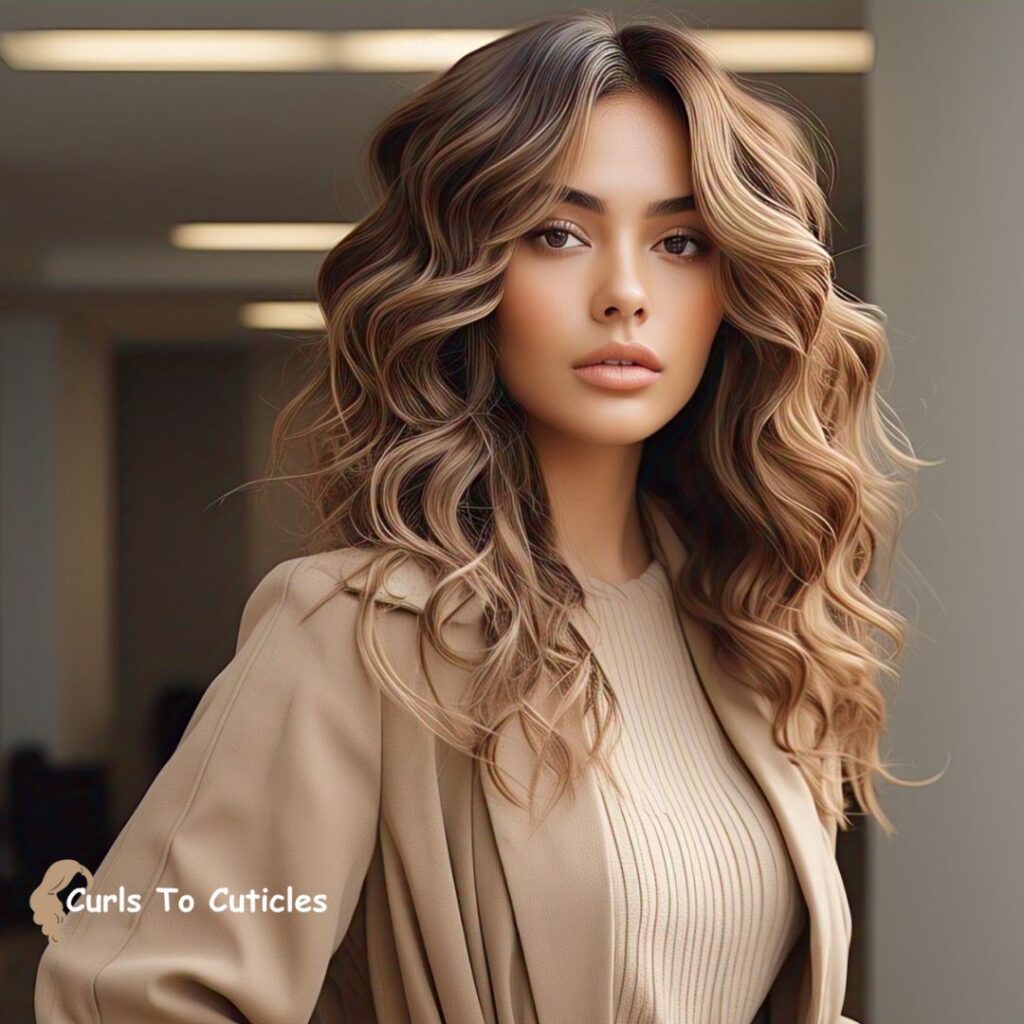
Go for long, flowing hair with soft waves or curls. Layers that begin below the chin are perfect. Avoid poker-straight styles—curves and movement balance a square face beautifully.
Tips: Round shapes work better than straight lines. Avoid straight bangs and go for side-swept styles.
Best Hairstyles for Heart-Shaped Faces
Balance a wider forehead and narrow chin with hairstyles that add volume below the cheekbones.
Short Hairstyles for Heart-Shaped Faces
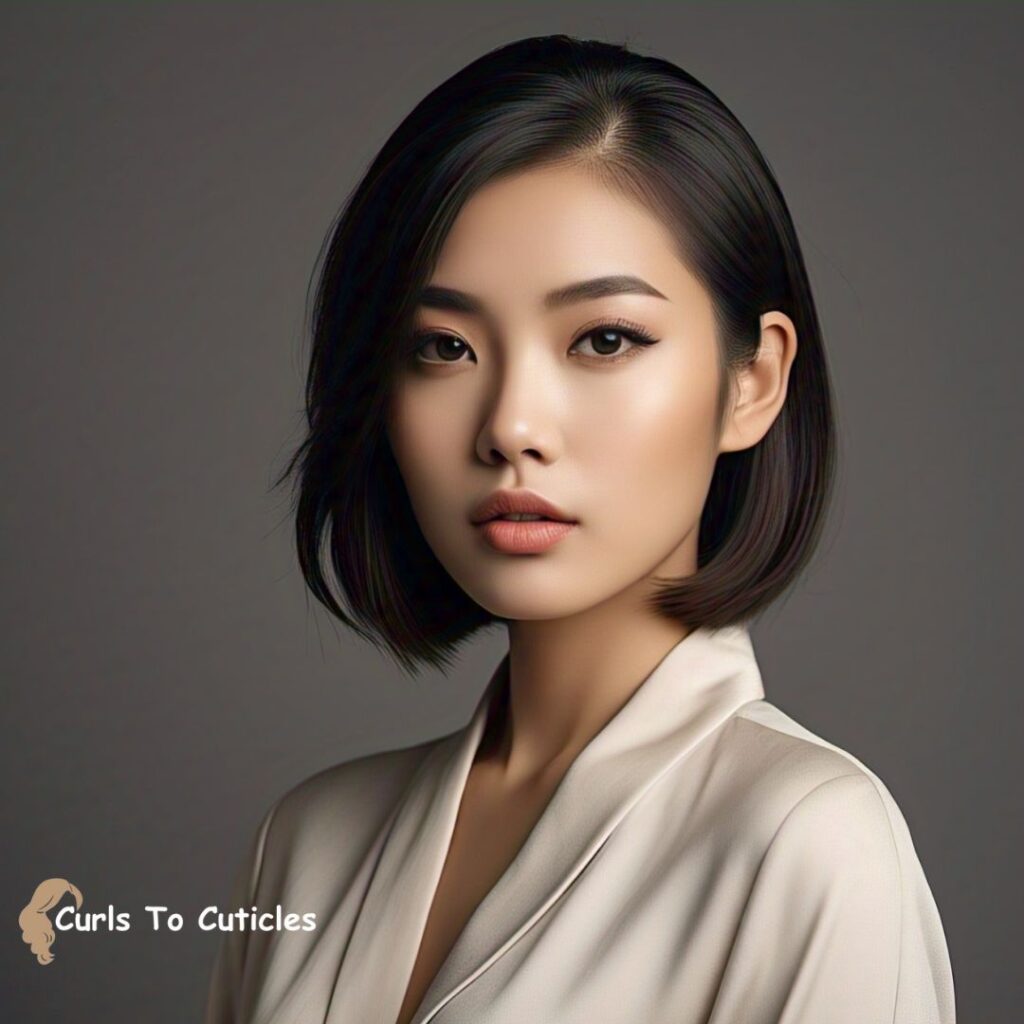
A chin-length bob widens the lower half of the face for a more proportional look. Add side-swept bangs to draw attention away from the forehead and soften the transition between the top and bottom of the face.
Medium Hairstyles for Heart-Shaped Faces

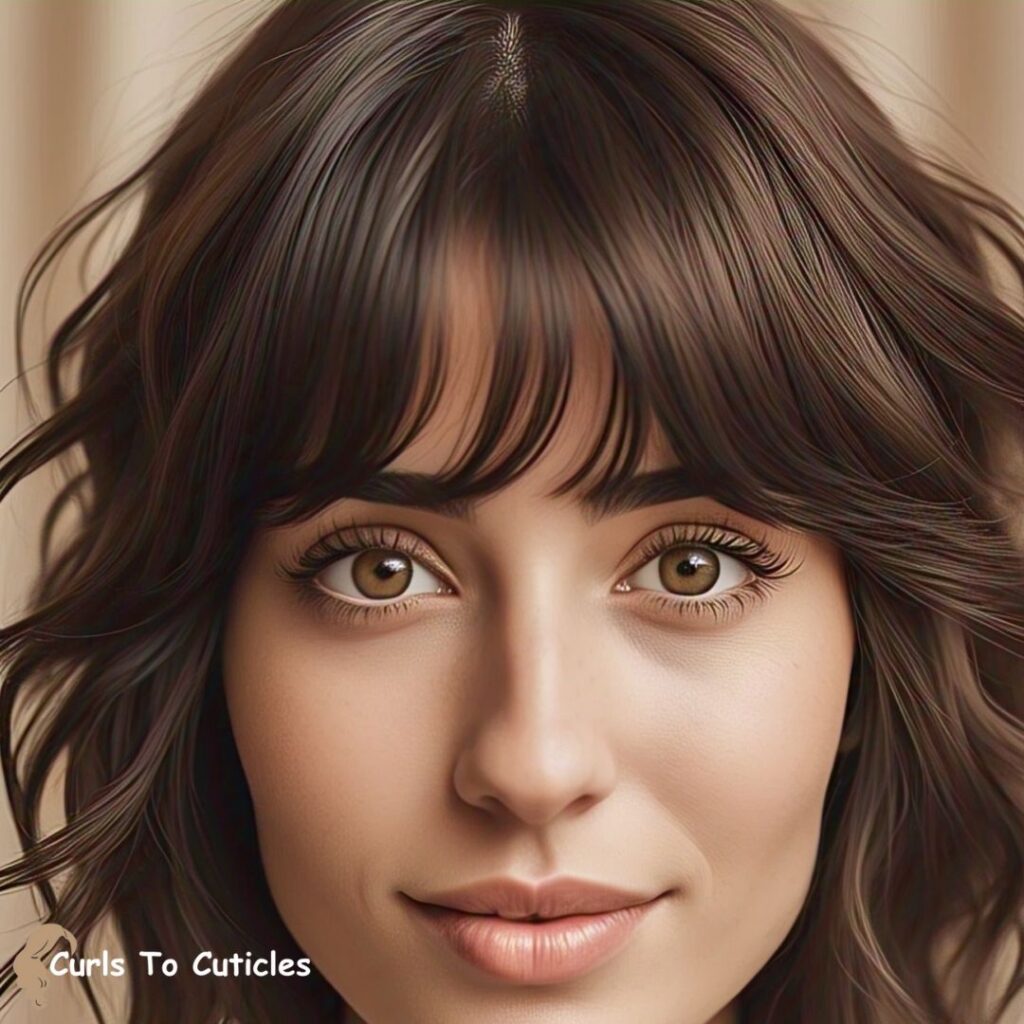
Shoulder-length layers that start below the ears help create volume around the jaw. A deep side part or curtain bangs can balance the width of the forehead and draw attention to the eyes.
Long Hairstyles for Heart-Shaped Faces
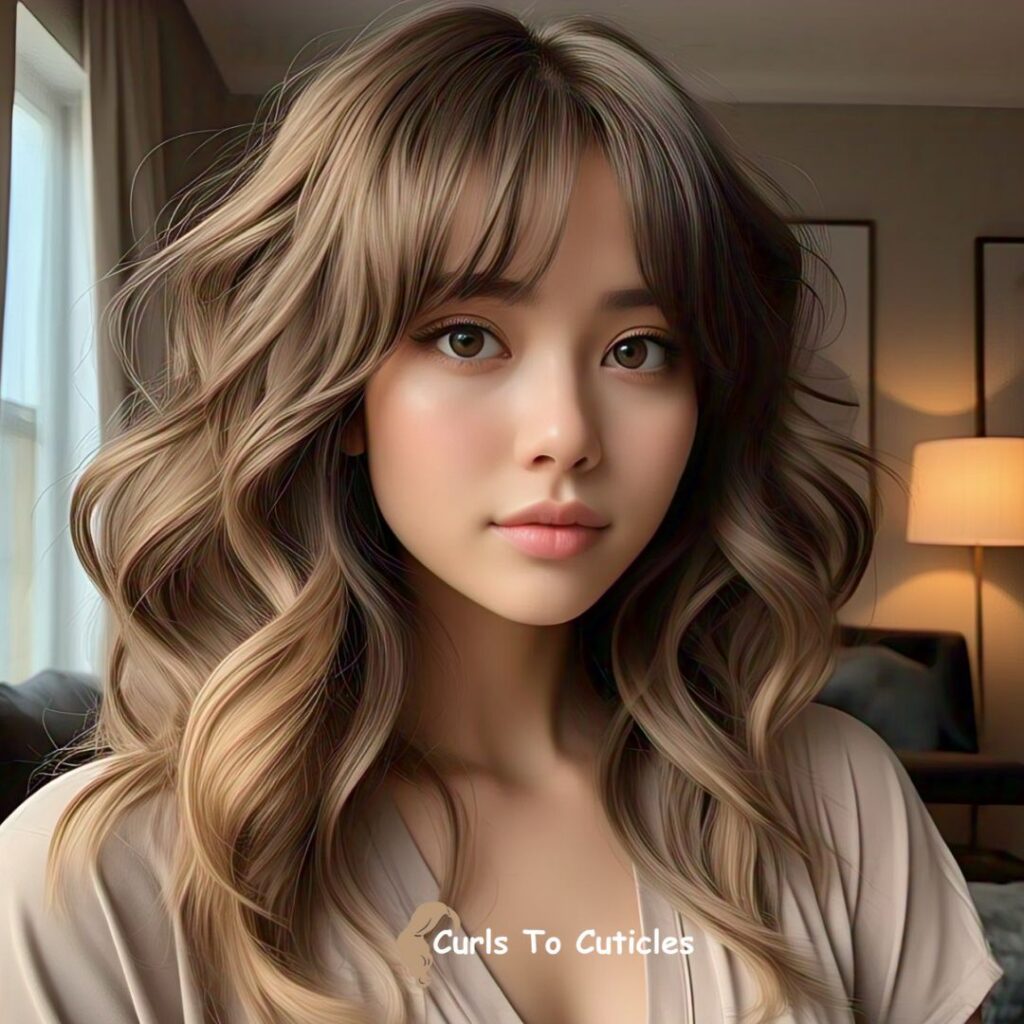
Loose waves or curls beginning below the chin add softness and dimension. Avoid straight styles that highlight the forehead. Instead, use texture and layers to draw the eye downward.
Tips: Focus on fullness near the bottom of your face. Avoid high volume at the top and very short, blunt bangs.
Best Hairstyles for Diamond Faces
Diamond-shaped faces shine with hairstyles that broaden the forehead and jaw while softening the cheekbones.
Short Hairstyles for Diamond Faces
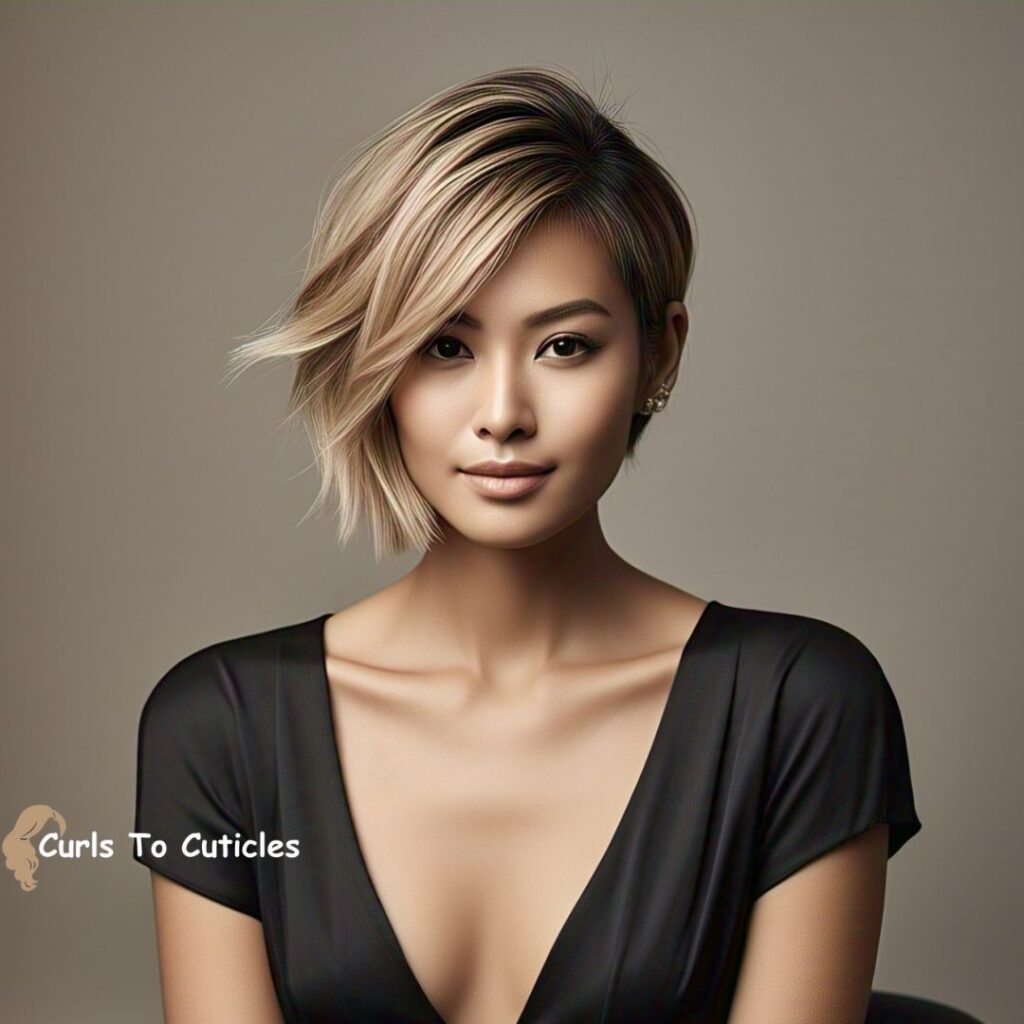
Try chin-length bobs or tousled pixies with volume at the crown. A textured top and minimal volume on the sides make the face appear more balanced.
Medium Hairstyles for Diamond Faces
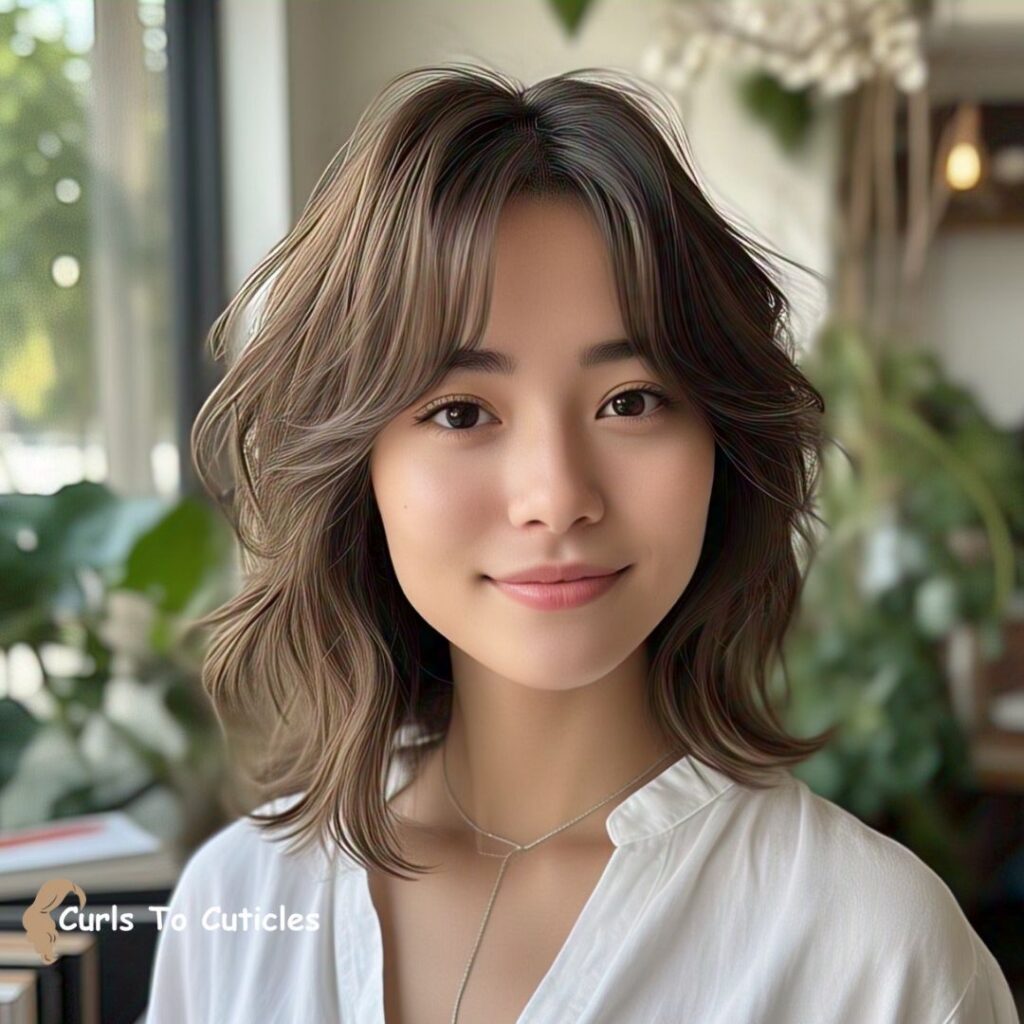
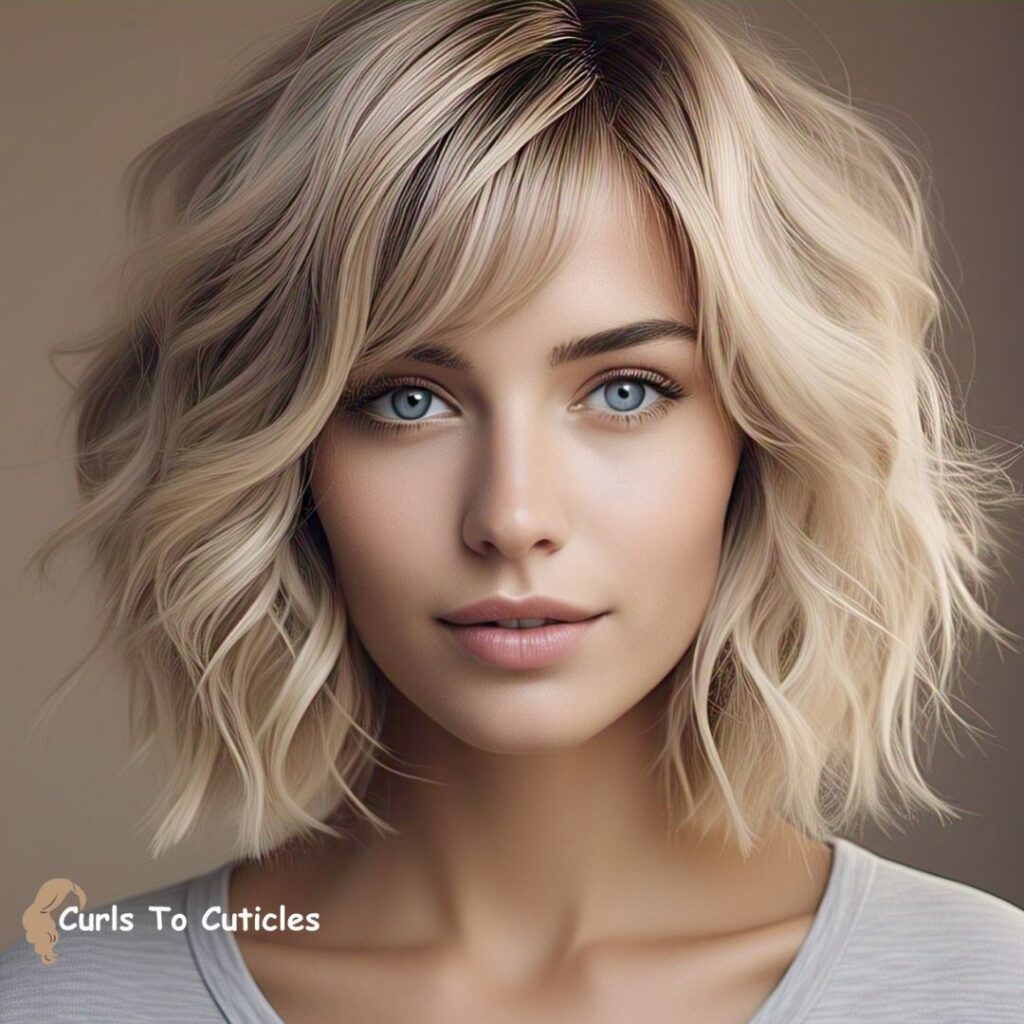
Shoulder-length cuts with chin-level layers help add width to the jaw. Side-swept bangs reduce the sharpness of cheekbones and bring focus to your eyes.
Long Hairstyles for Diamond Faces

Choose long layers that begin around the chin. Soft waves can help widen the forehead and jawline. Avoid volume near the cheeks, which can make the face look too angular.
Tips: Avoid styles that slick the hair back tightly. Add volume where needed—forehead and jawline, not cheekbones.
Best Hairstyles for Long Faces
Long faces benefit from styles that break up length and add fullness at the sides.
Short Hairstyles for Long Faces
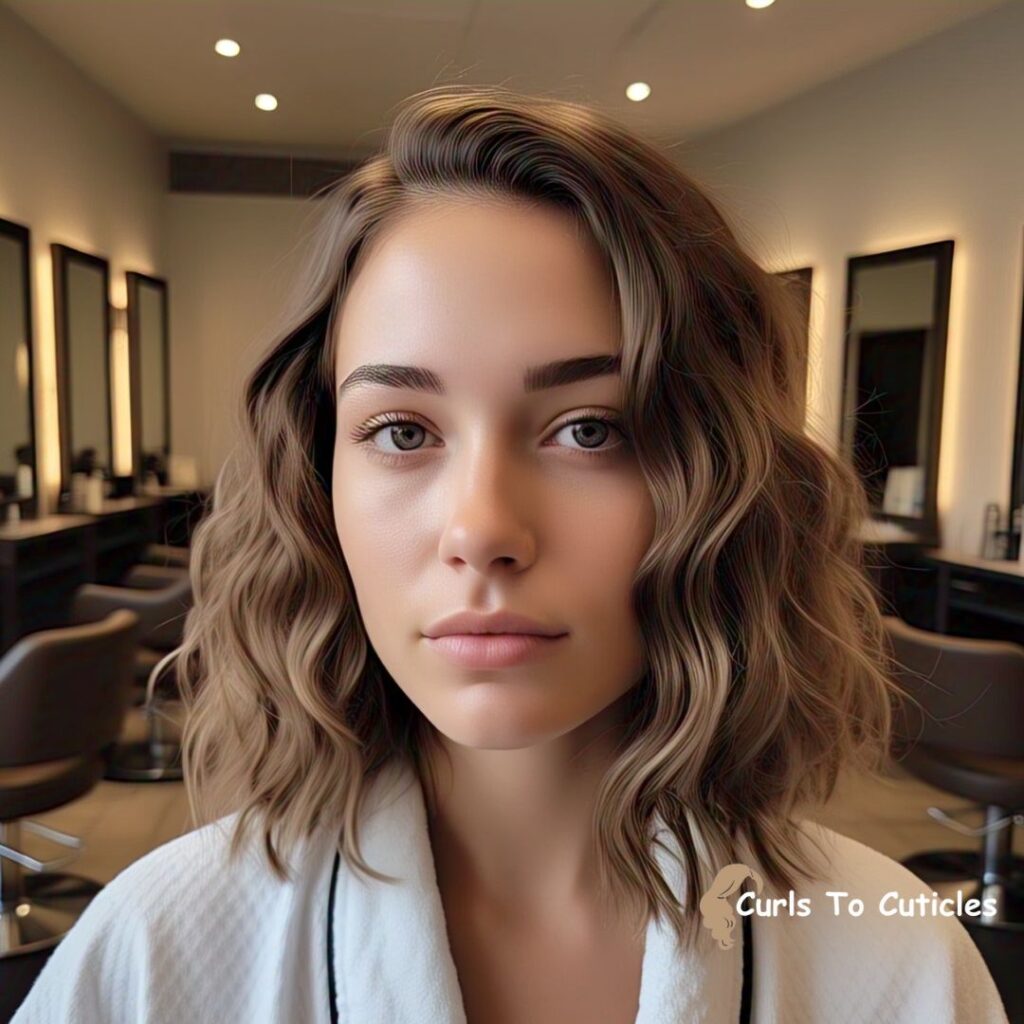
A wavy bob that ends at the chin or jawline is ideal. This adds width and cuts down the vertical length. Keep volume on the sides and avoid adding height on top.
Medium Hairstyles for Long Faces
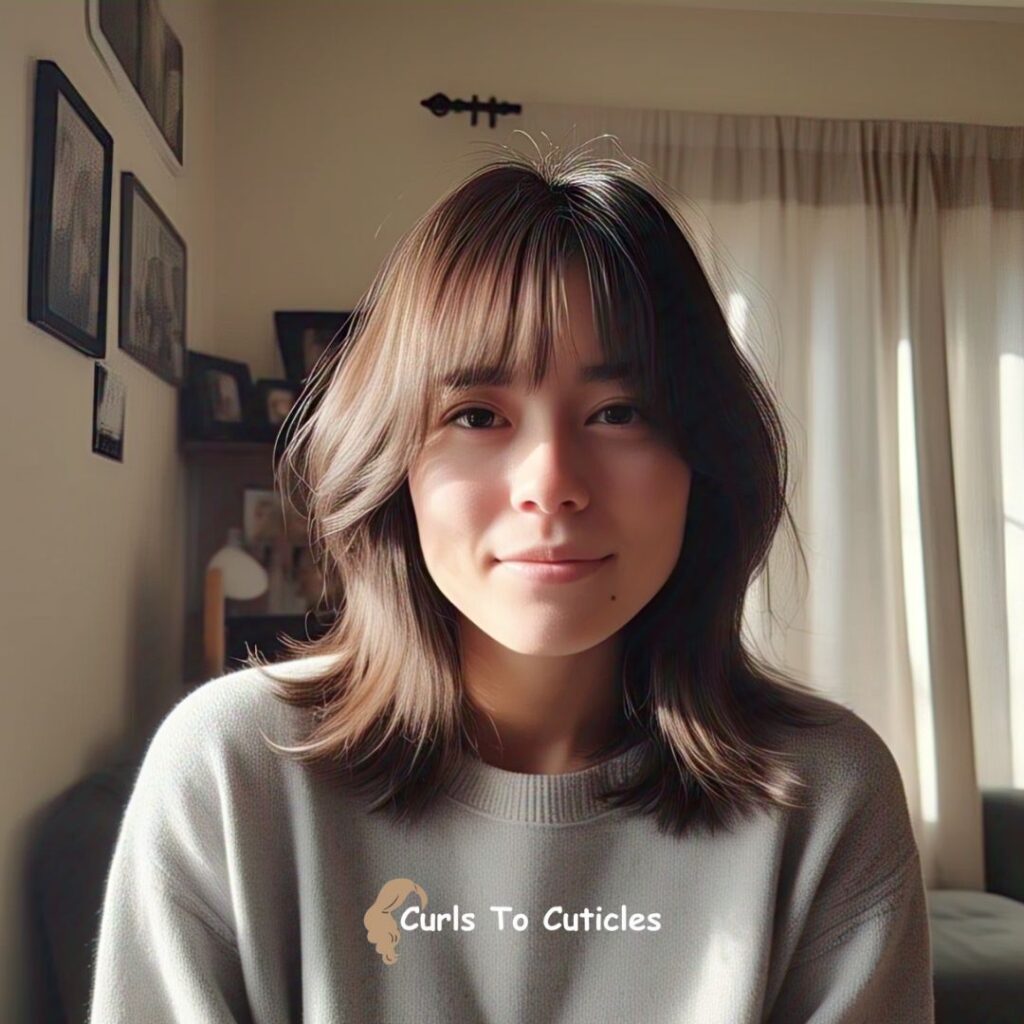
Try layers that start near the cheekbones. Medium-length cuts with curtain bangs or blunt fringe help visually shorten the face and create balance.
Long Hairstyles for Long Faces
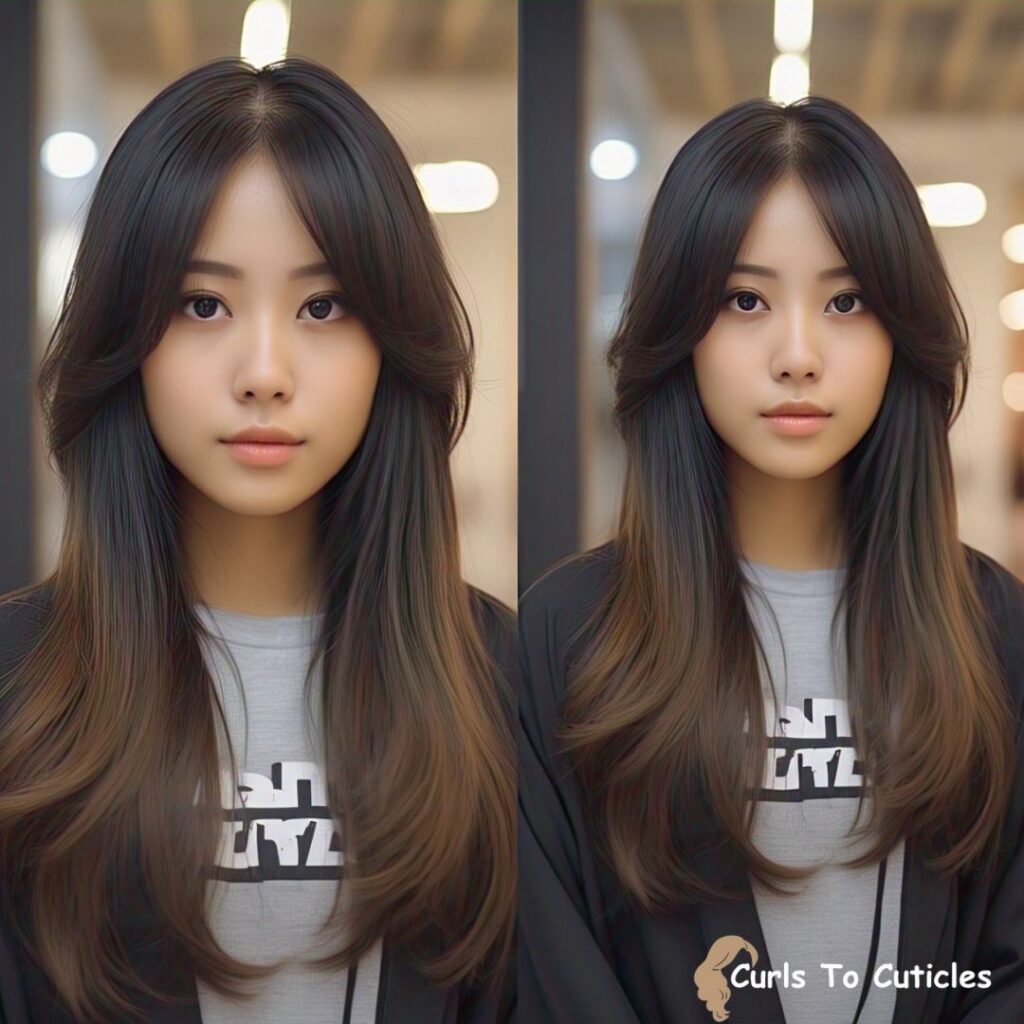
Go for long, wavy styles with soft layers and face-framing pieces. Straight-across bangs or curtain bangs help “cut” the face length visually.
Tips: Avoid long, flat styles with no shape. Add width through waves or curls and minimize volume at the crown.
Best Hairstyles for Triangle Faces
Balance a wide jaw and narrow forehead with volume up top and softness below.
Short Hairstyles for Triangle Faces
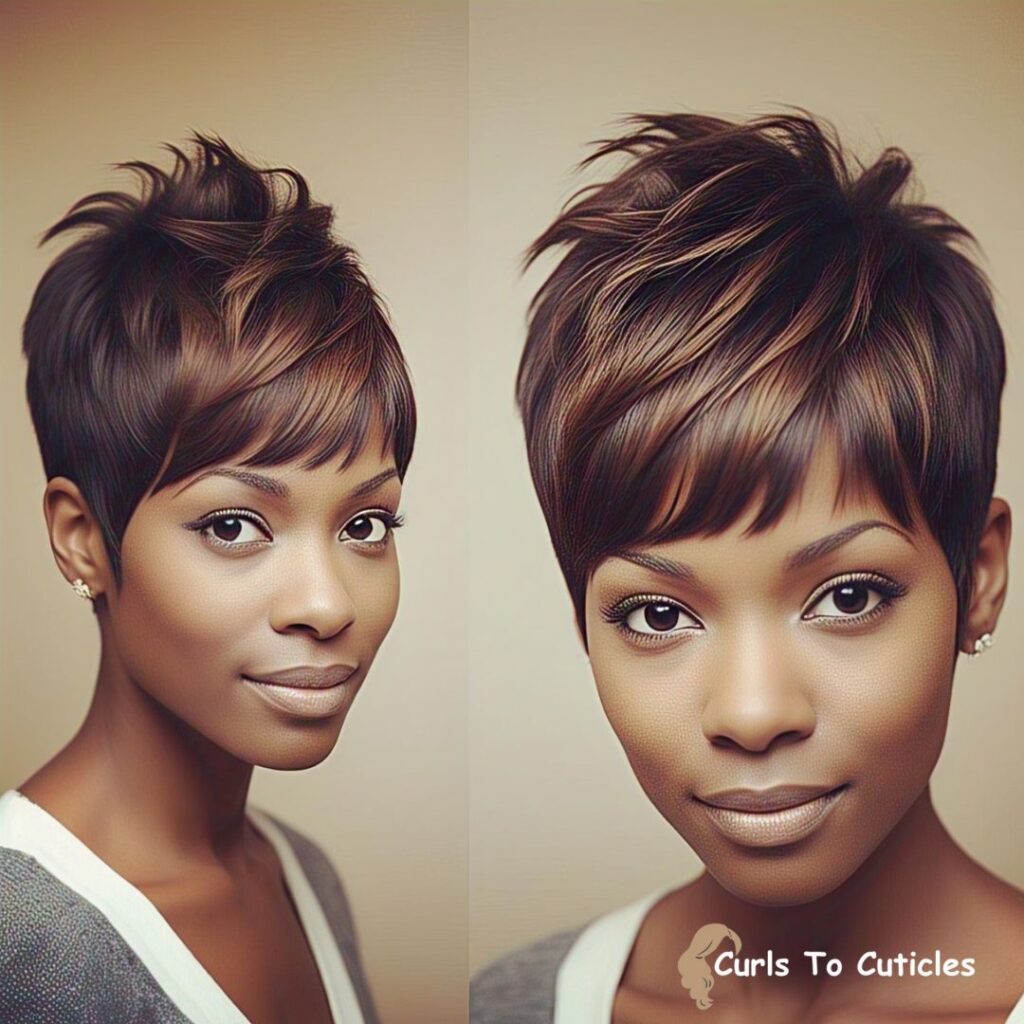
A pixie cut with volume on top helps draw the eye upward. Side-swept bangs give the illusion of a wider forehead. Avoid styles that sit right at the jaw.
Medium Hairstyles for Triangle Faces
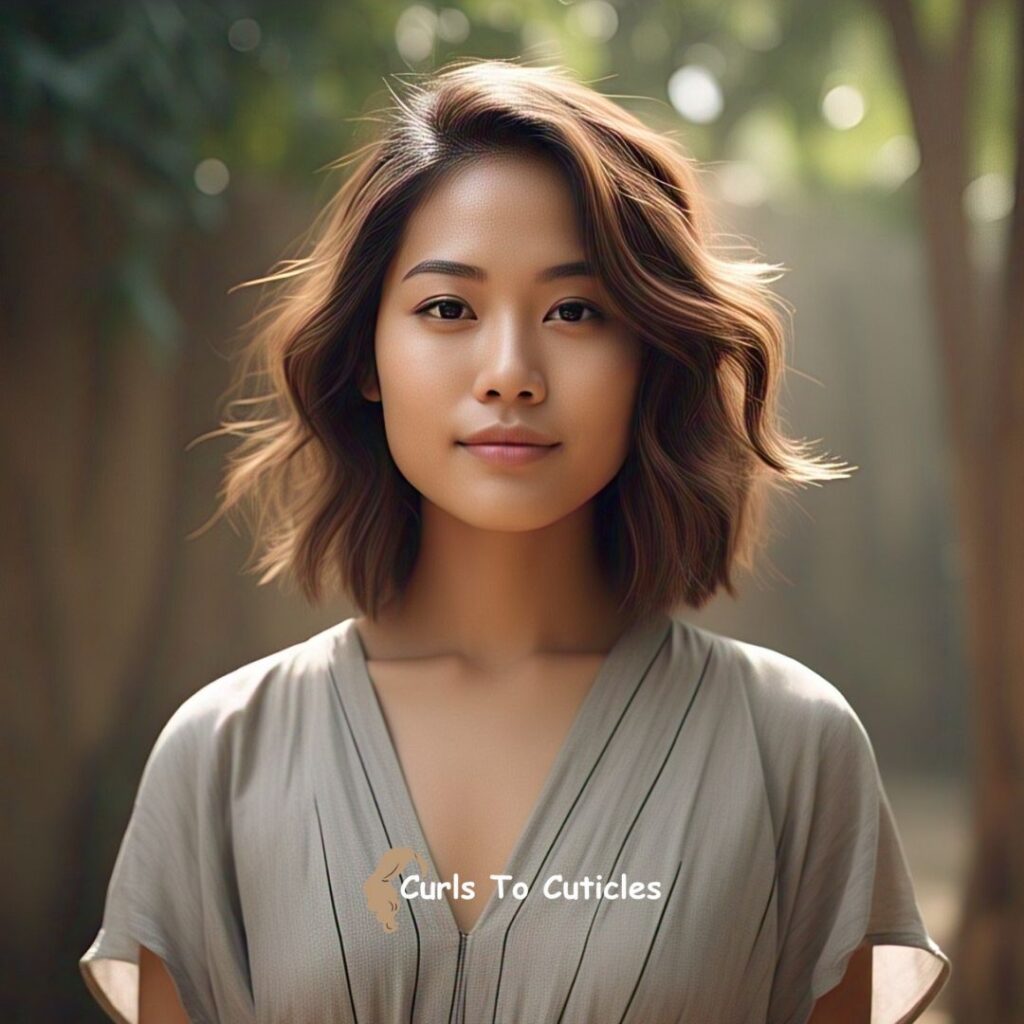
Shoulder-length cuts with layers around the temples add width to the upper face. A voluminous crown paired with soft, tapered ends works well to balance out a heavier jawline.
Long Hairstyles for Triangle Faces
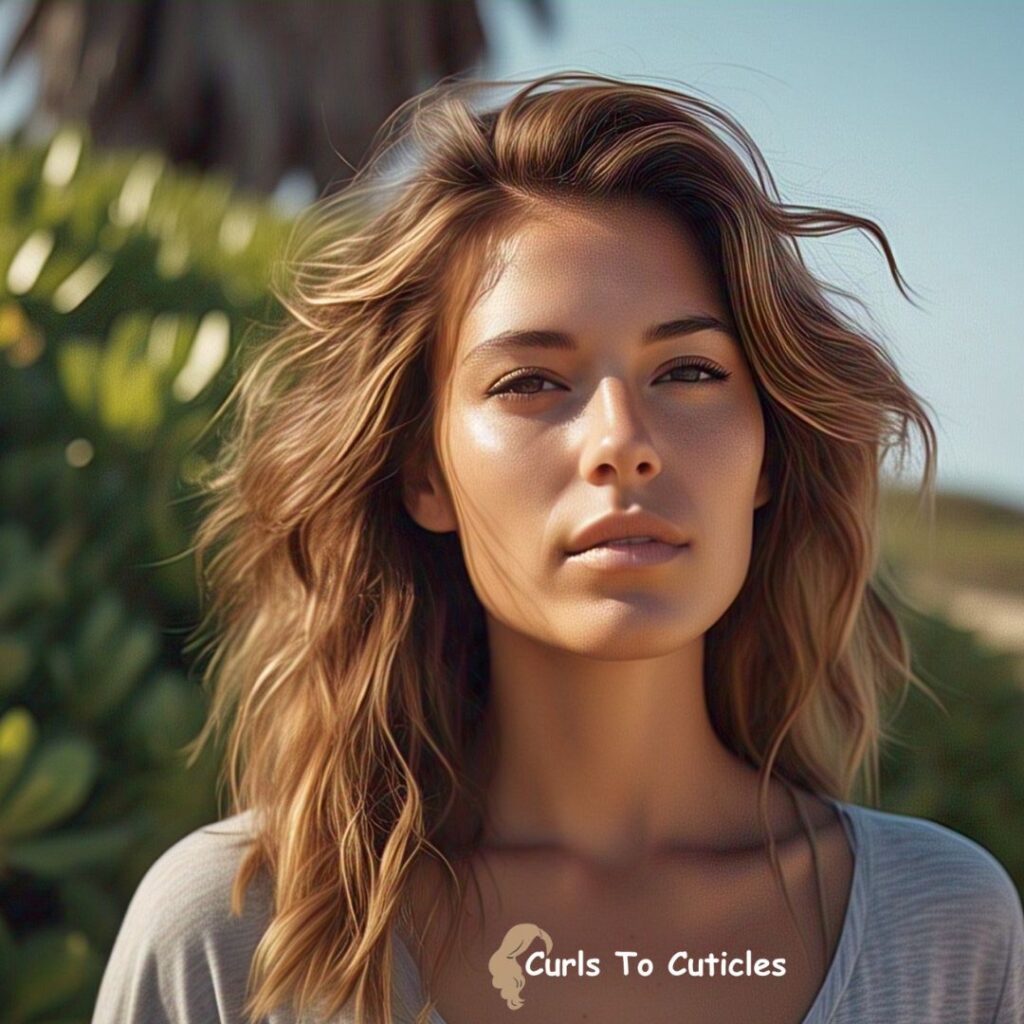
Long styles with top-heavy volume and soft waves toward the chin are ideal. Avoid straight, heavy ends that highlight jaw width.
Tips: Choose styles that give fullness above the ears. Stay away from cuts that stop at the jawline.
Choosing Hairstyles Based on Hair Type
Even if you know your face shape, your hair type also matters. Here are quick tips:
Straight Hair
This type falls naturally and often lacks volume. Add layers or waves to avoid a flat look. Long layers work for most face shapes.
Wavy Hair
Waves add softness and movement. This hair type works well with layered cuts and medium-length styles.
Curly Hair
Curly hair has volume and bounce. Use layers to shape the curls. Avoid triangle-shaped cuts where the volume sits at the ends.
Coily Hair
Tight curls need structure. Short styles with defined shapes work well. Longer coily hair should be layered to prevent bulkiness.
Download Below Infographic For Future Use
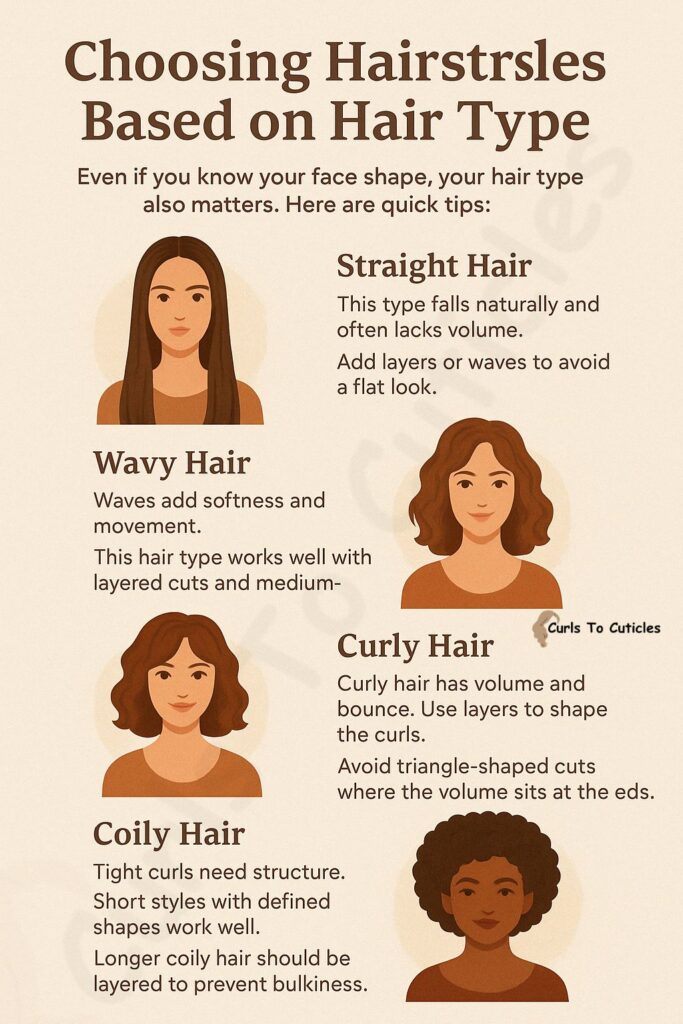
How Bangs Change Your Look
Bangs can change the way your face looks. The right bang style can help balance your features.
- Side-swept bangs soften square and heart shapes.
- Blunt bangs work for long faces but may not suit round or square shapes.
- Curtain bangs frame the face gently and work for most face shapes.
- Wispy bangs add softness without too much volume.
Choose bangs that help create the shape you want. Use them to draw attention to your eyes or soften hard lines.
Styling Tips for Each Face Shape
Oval Face

- Try a middle or side part.
- Layers help add body without changing shape.
- Updos and ponytails also work well.
Round Face
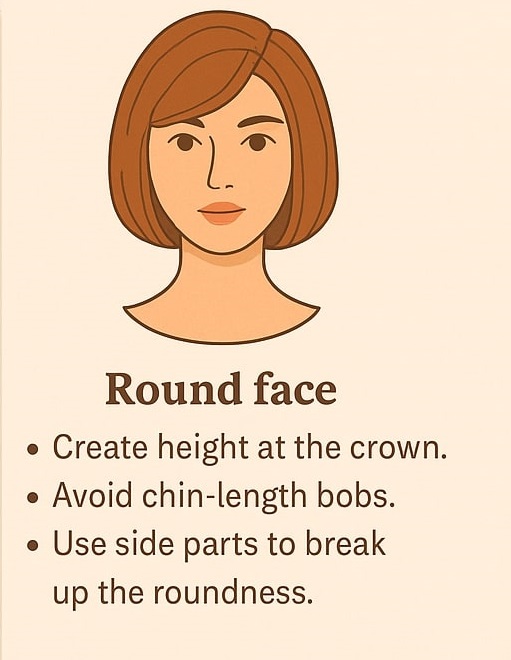
- Create height at the crown.
- Avoid chin-length bobs.
- Use side parts to break up the roundness.
Square Face
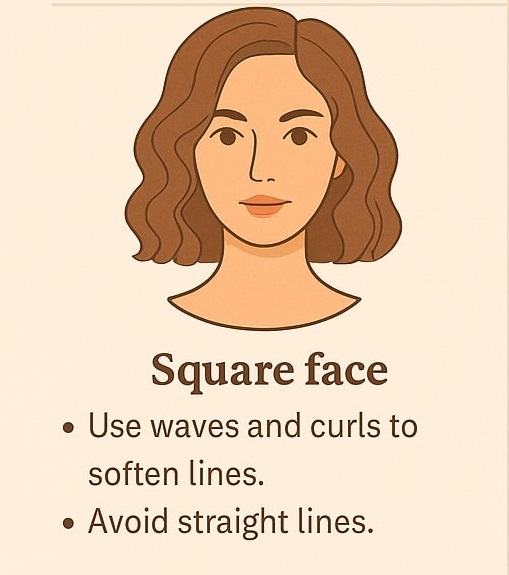
- Use waves and curls to soften lines.
- Avoid straight lines.
- A deep side part adds movement.
Heart Face
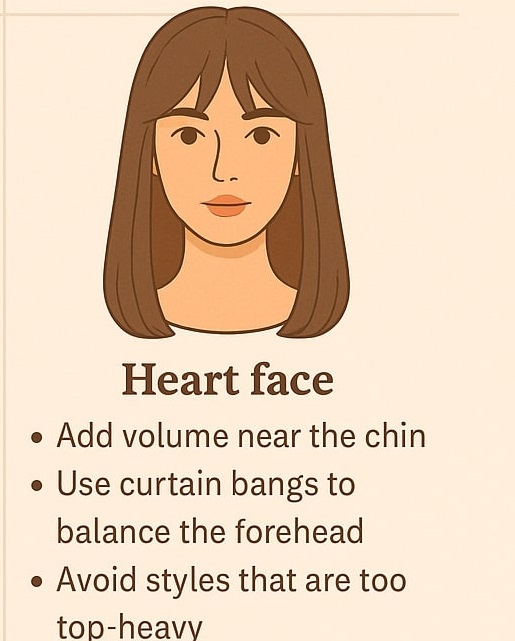
- Add volume near the chin.
- Use curtain bangs to balance the forehead.
- Avoid styles that are too top-heavy.
Diamond Face

- Add width at the forehead with bangs.
- Avoid styles that tuck behind the ears.
- Choose layered cuts that fall around the jawline.
Long Face
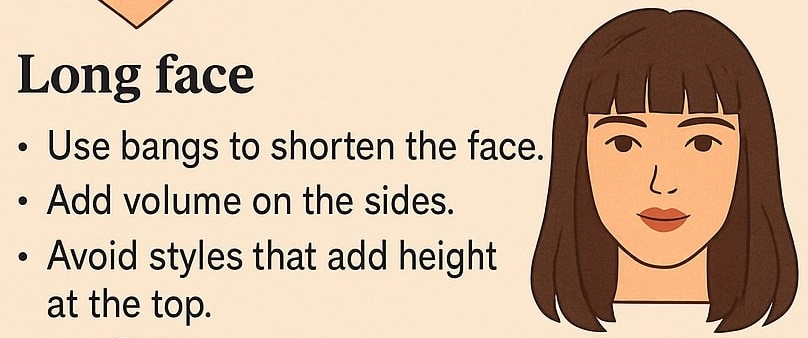
- Use bangs to shorten the face.
- Add volume on the sides.
- Avoid styles that add height at the top.
Triangle Face
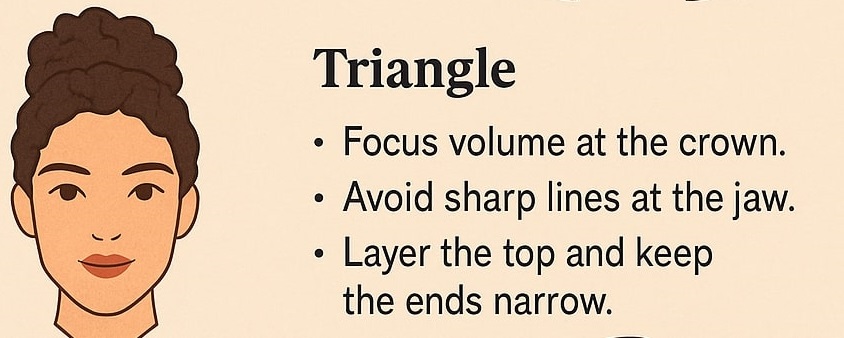
- Focus volume at the crown.
- Avoid sharp lines at the jaw.
- Layer the top and keep the ends narrow.
Easy Everyday Styles
You don’t always need a full haircut to flatter your face. Here are a few everyday styles I like to use, based on face shape:
- Ponytails: High ponytails work well for round and heart-shaped faces. Low ponytails work better for square and long faces.
- Buns: Top knots suit oval and round faces. Low buns help soften long and square faces.
- Braids: Side braids soften strong jawlines. Crown braids add width to narrow foreheads.
Adjust each style to suit your shape. Use bobby pins, parting changes, and accessories to make quick changes.
More Visual Explanation
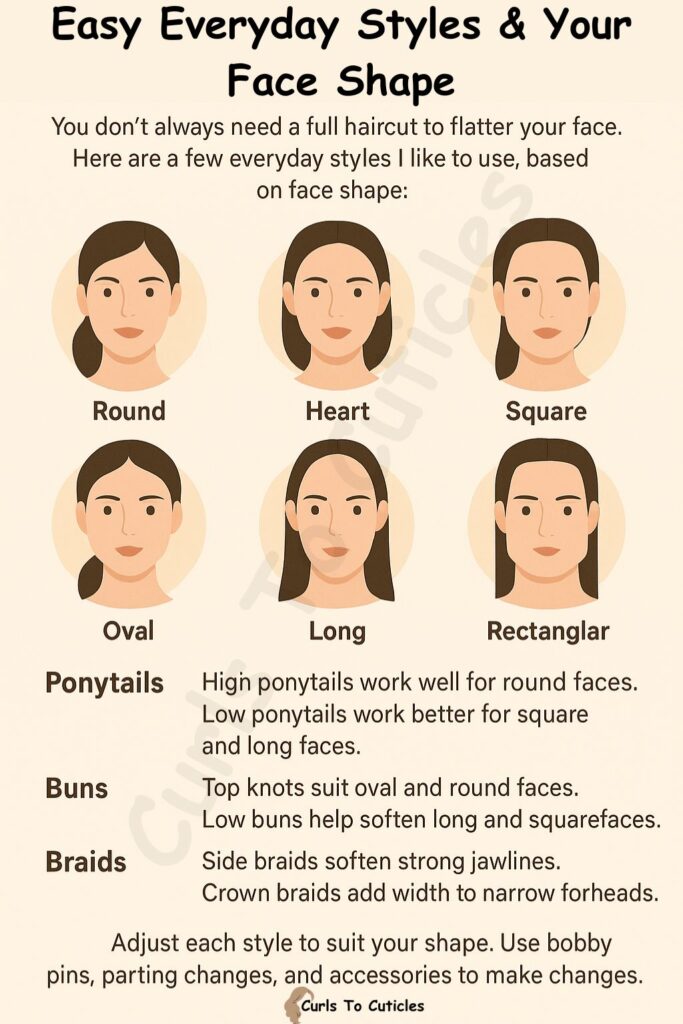
Final Thoughts
The right hairstyle brings out your best features. Once you know your face shape, you can make smarter style choices. Don’t be afraid to try new looks. Start with small changes. See what works best for you.
Remember, the shape of your face is only one part of the picture. Your hair texture, lifestyle, and personal taste matter too. Combine what you learn here with your own preferences. This way, you get a look that feels right and looks great.

Hi, I’m Mia Sophia, a 31-year-old hair and nail care enthusiast from a small town in Tennessee. I love testing products, creating simple DIY treatments, and sharing what works through my blog. Everything I post is based on real experience and a love for everyday self-care. Whether it’s finding the right shampoo or growing stronger nails, I keep it easy, honest, and helpful.


